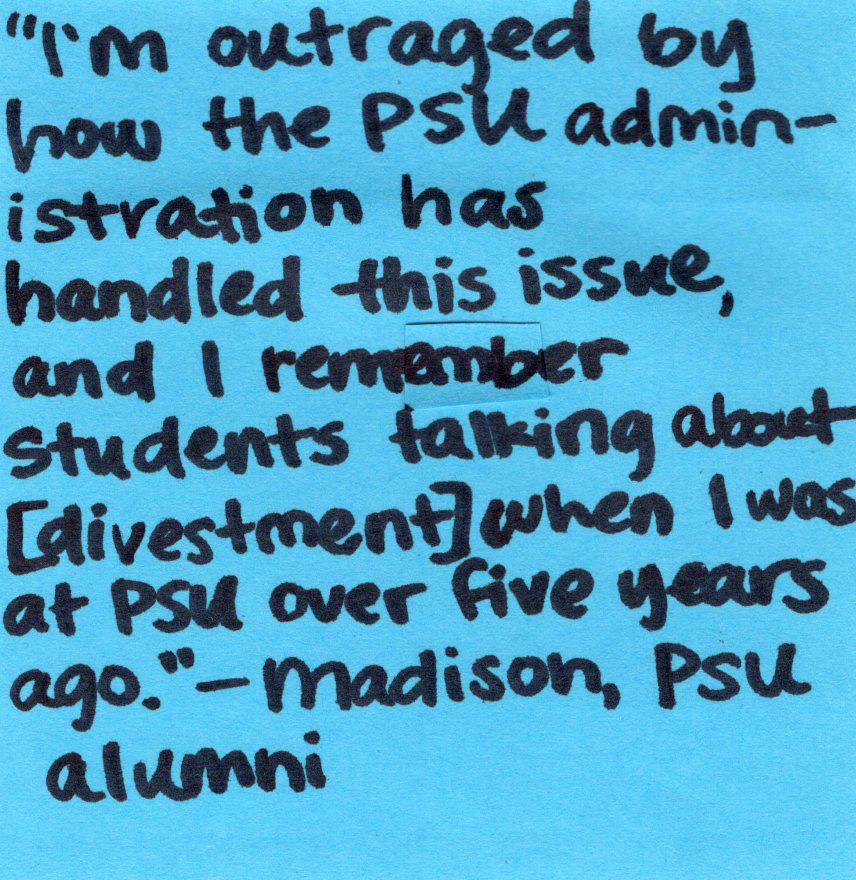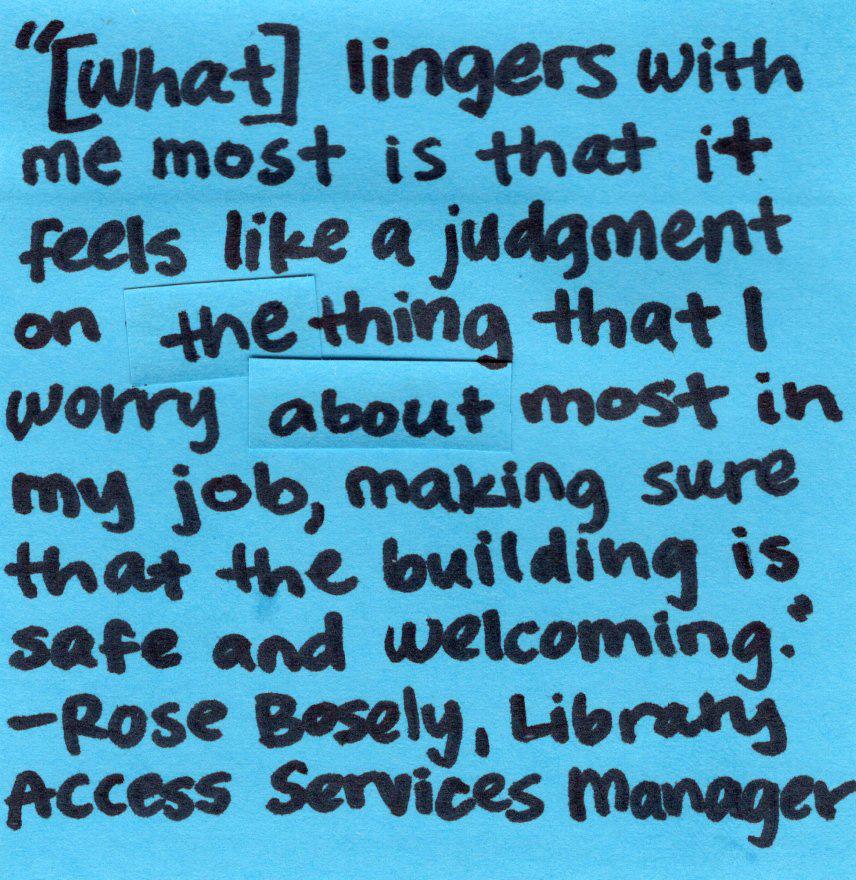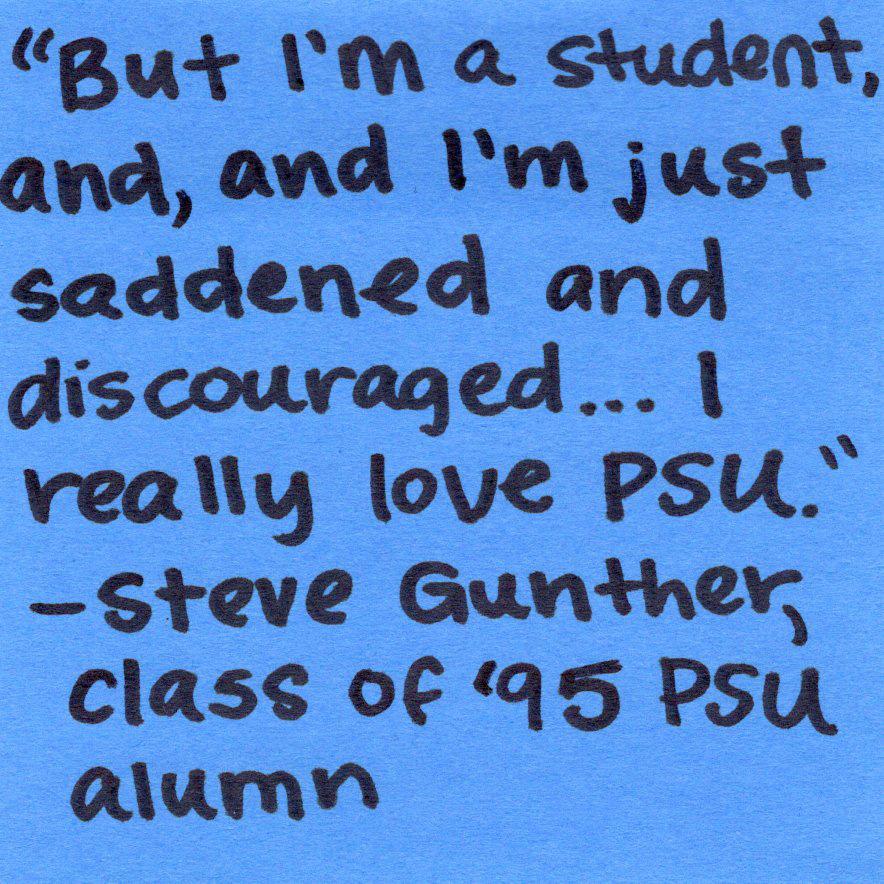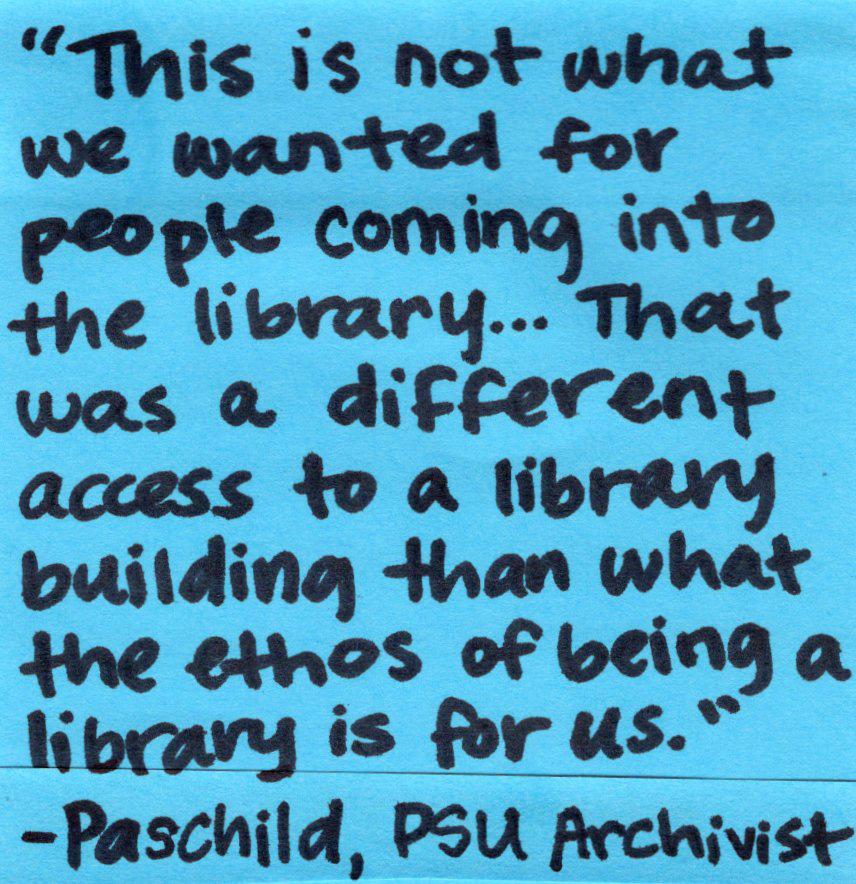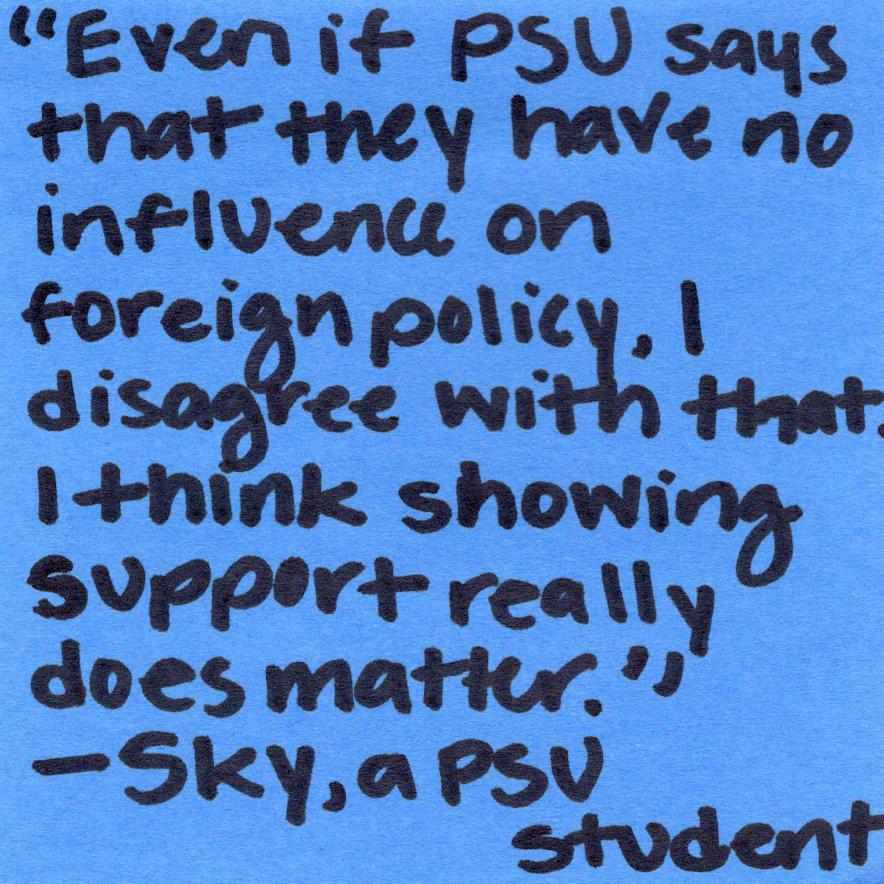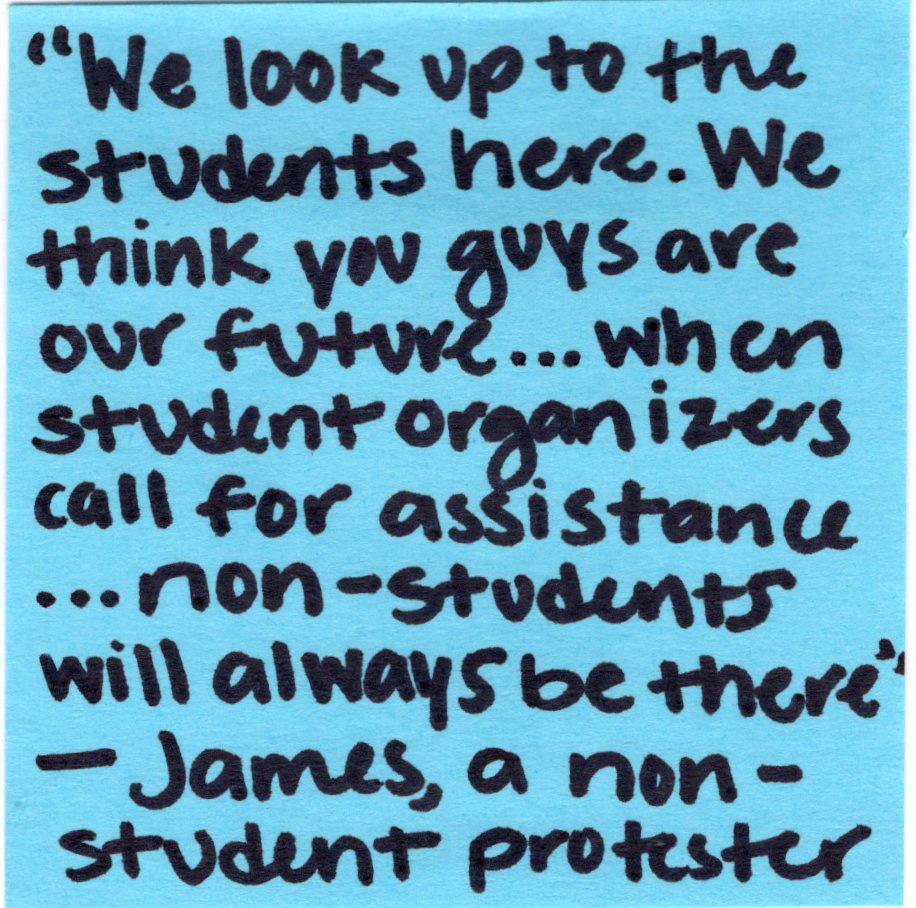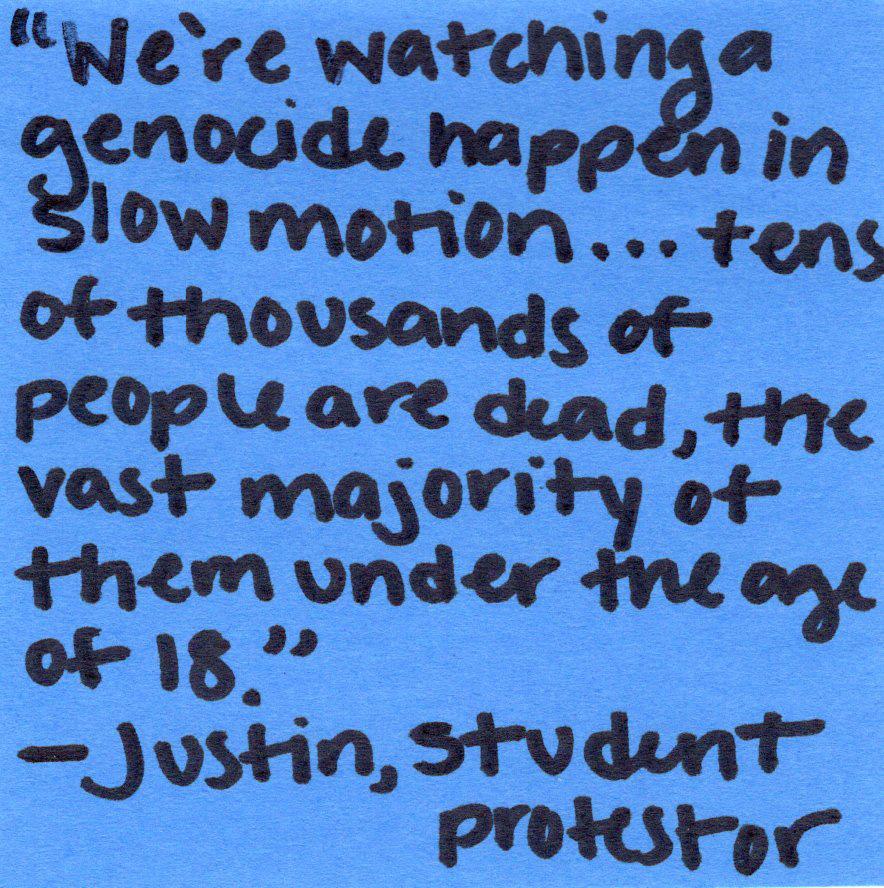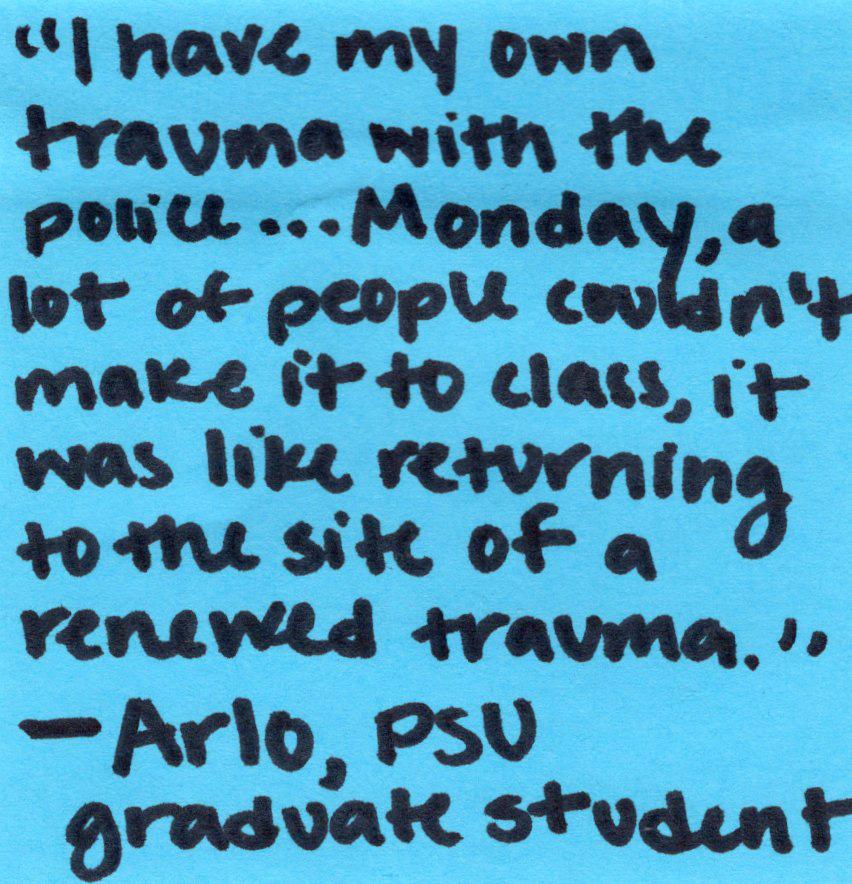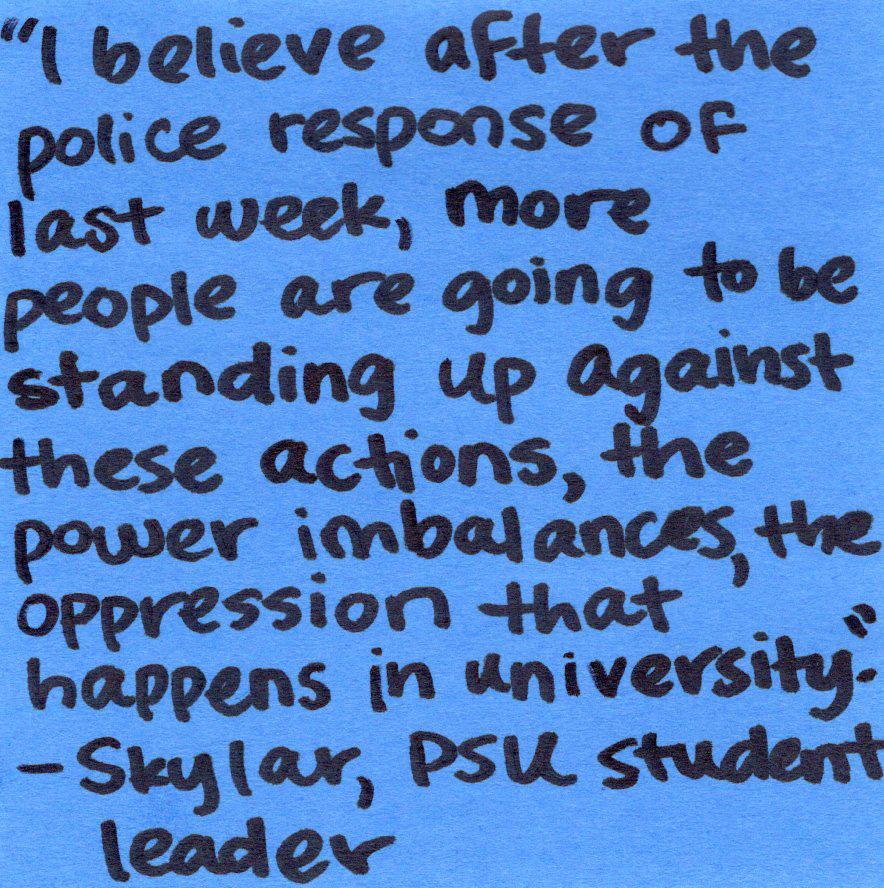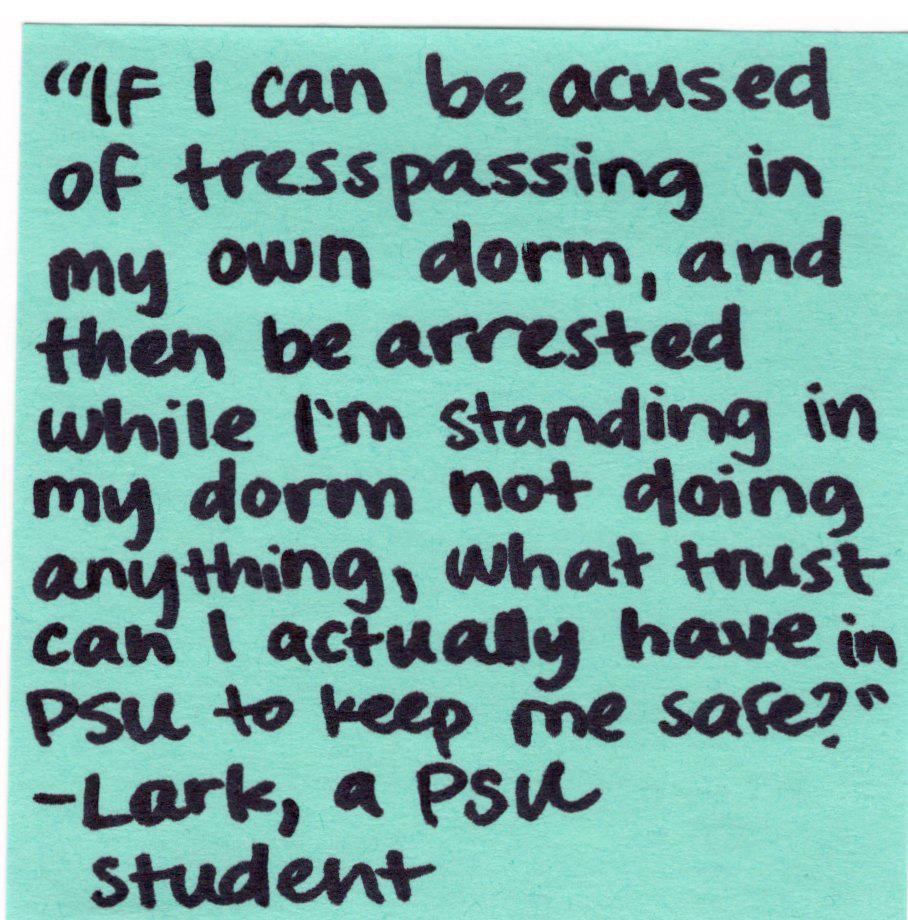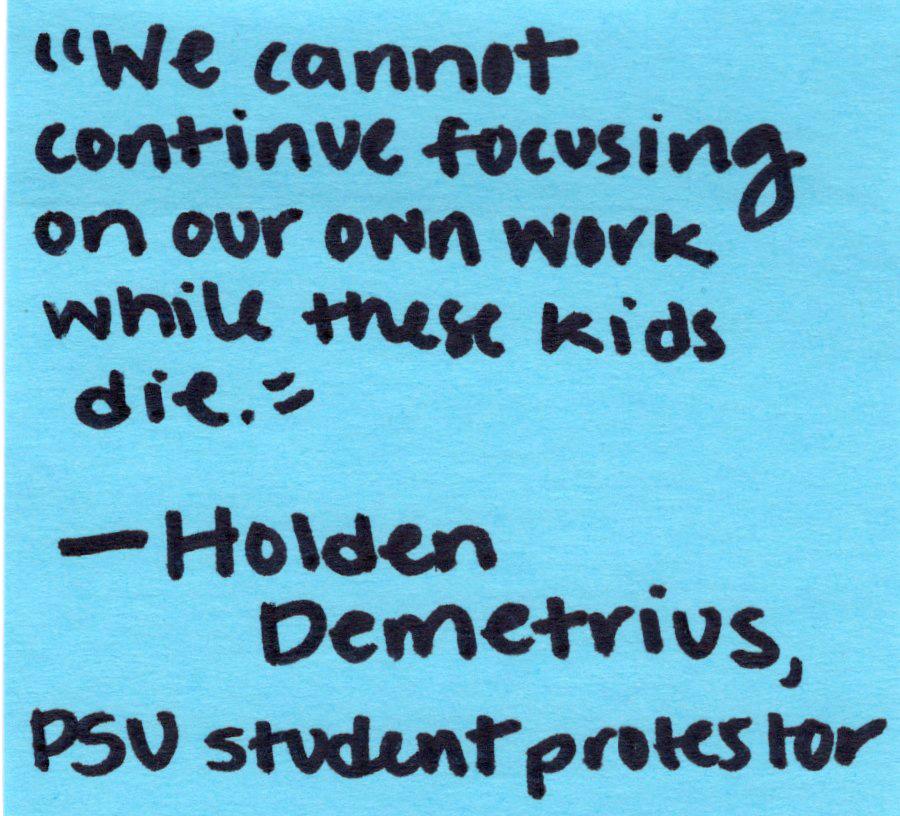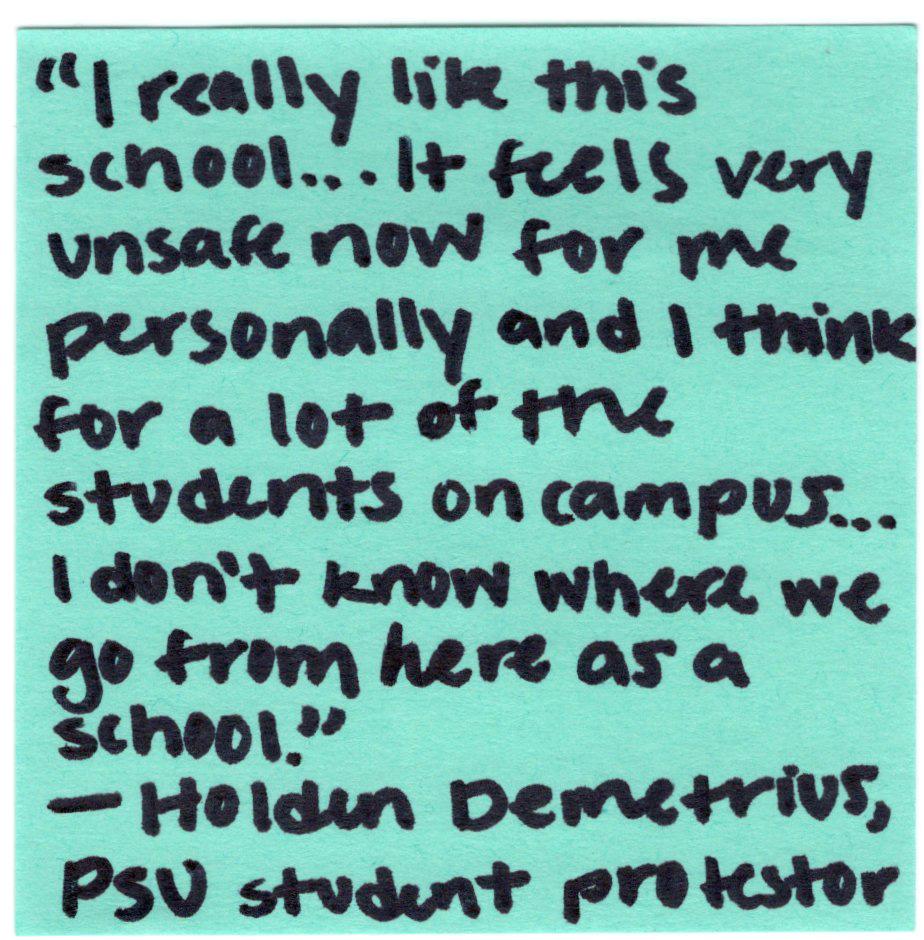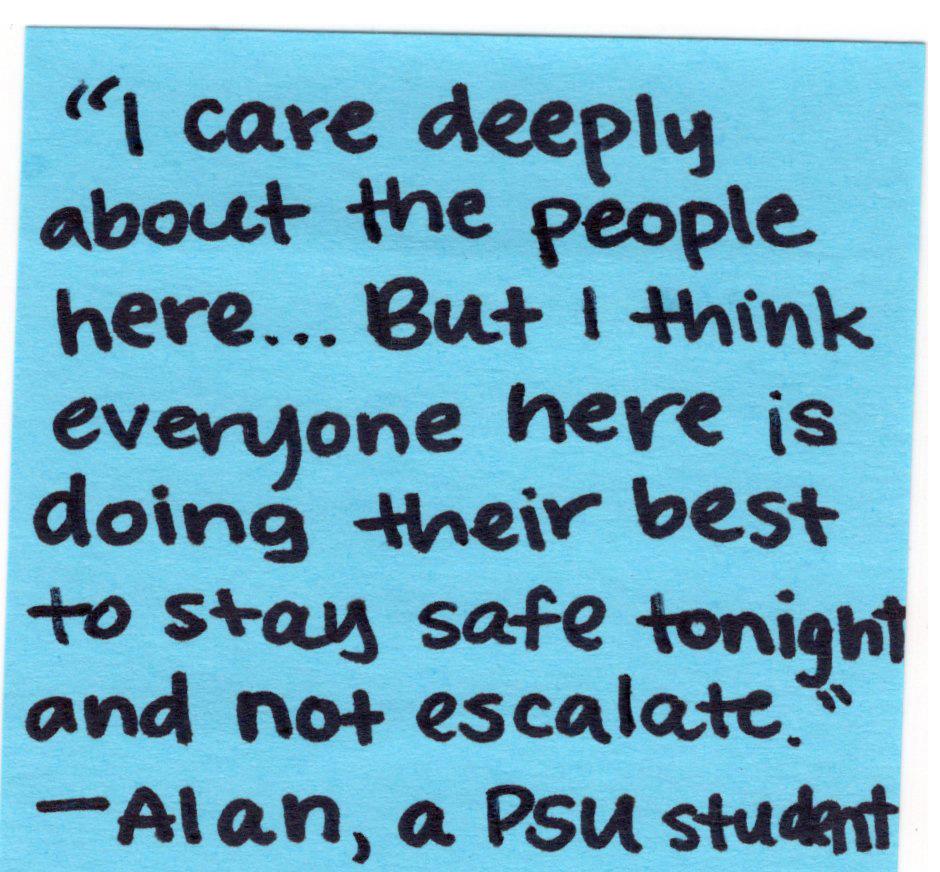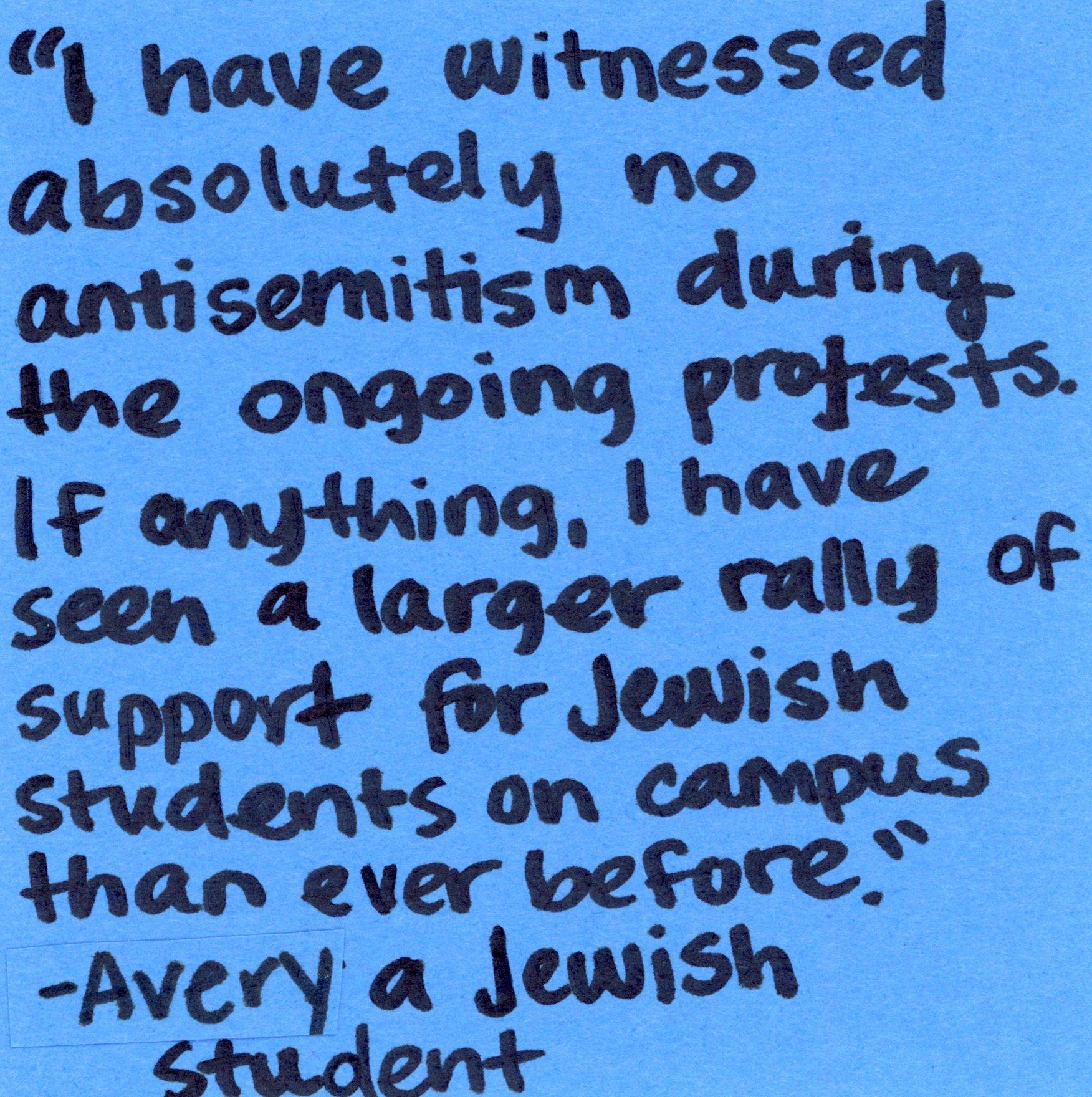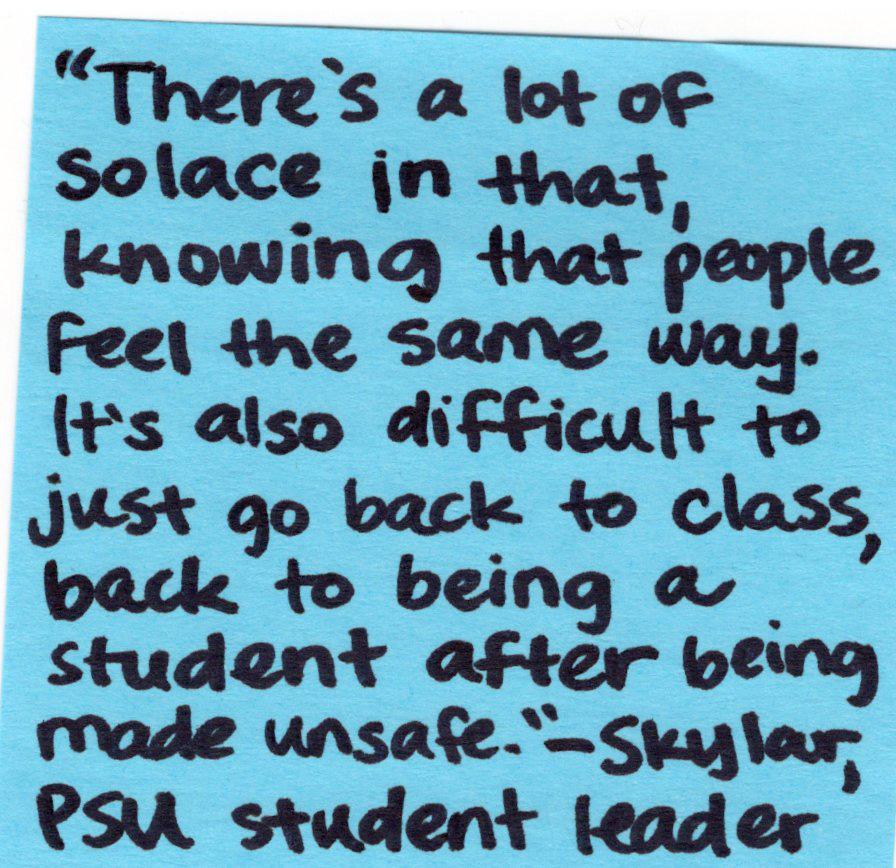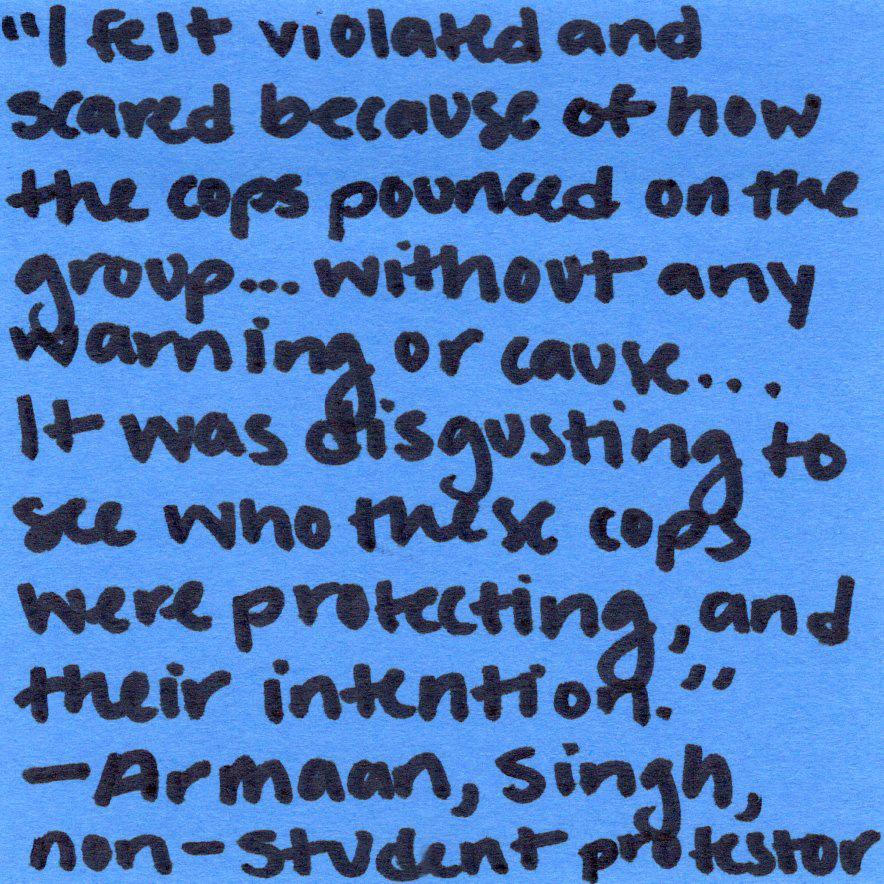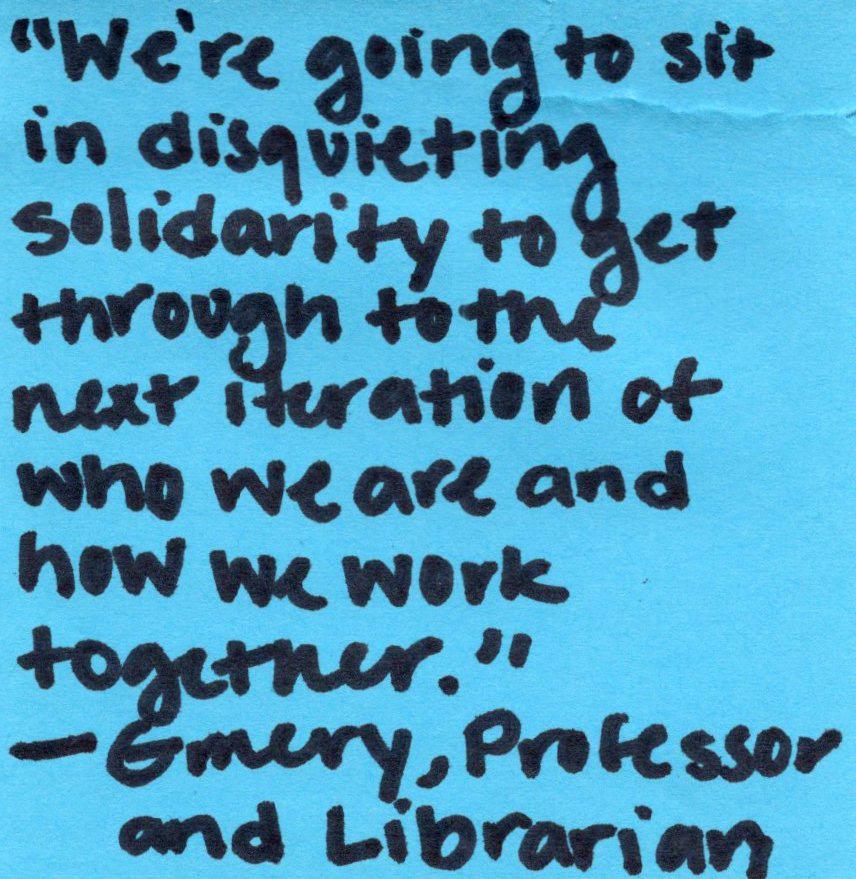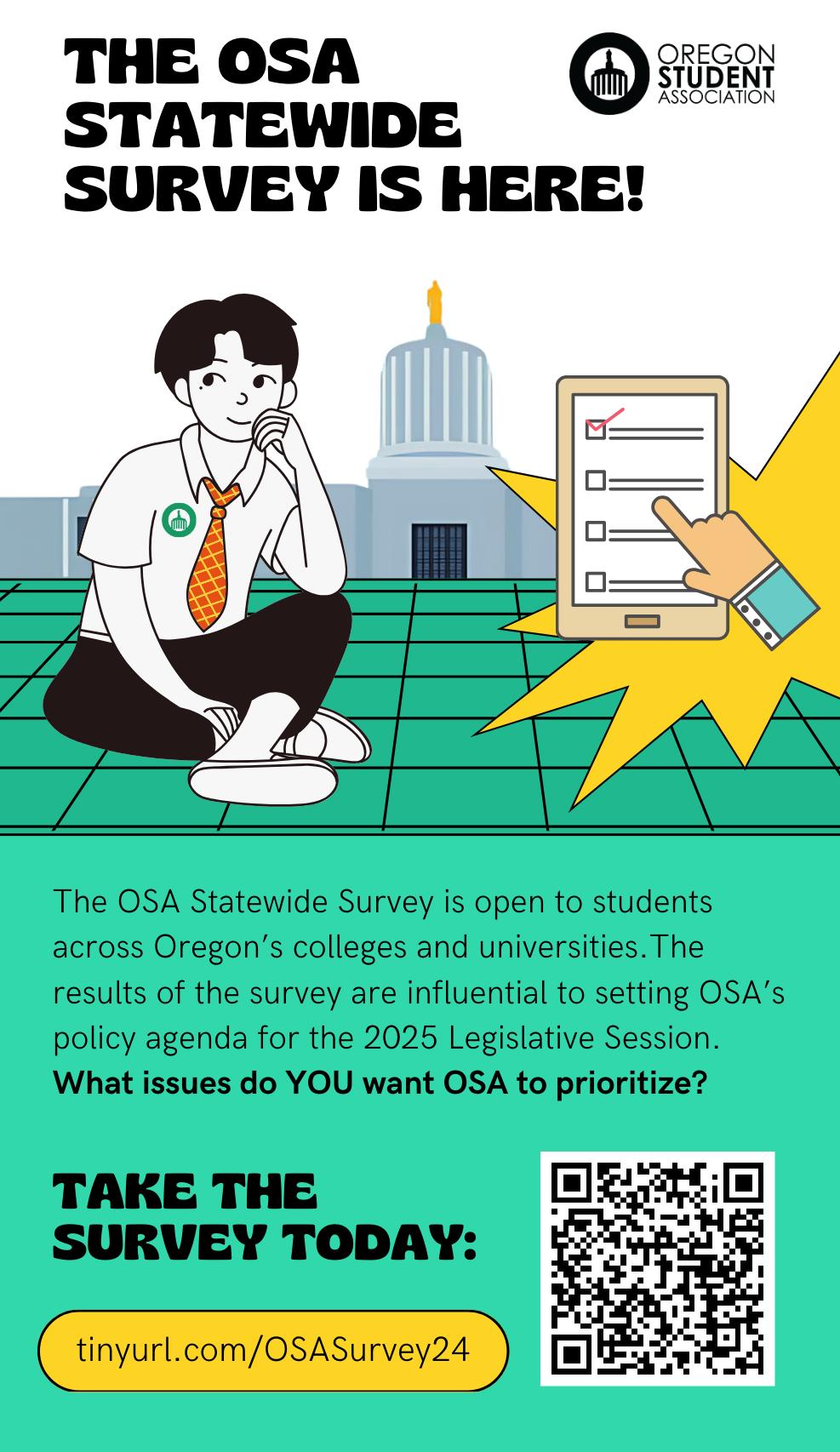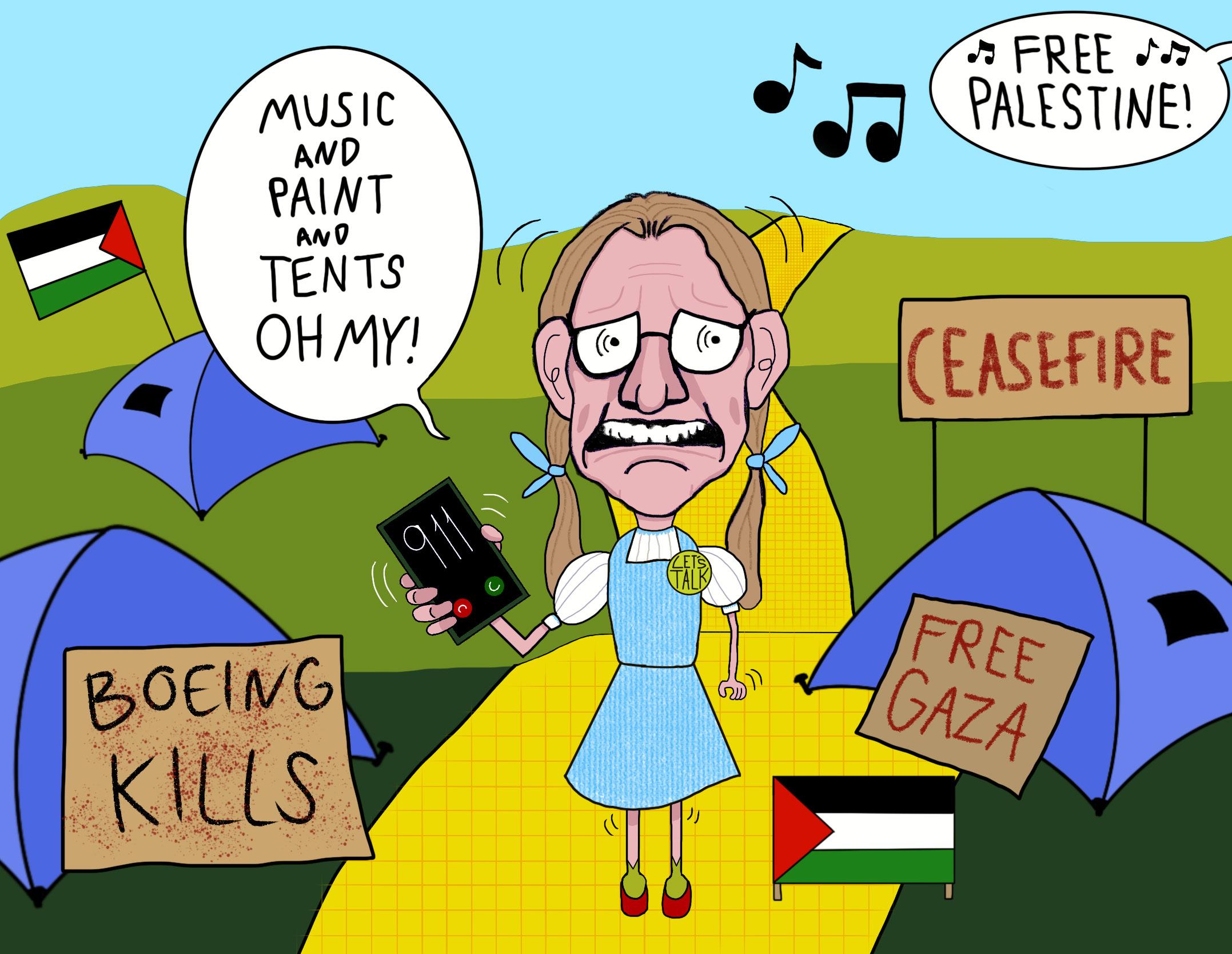






















•
EDITORIAL
Kat Leon
MANAGING EDITOR
Tasha Sayre
Zoë Buhrmaster CO-NEWS
Alyssa Anderson
Macie Harreld
Anish Kumar Arumugam OPINION
Cameron Rodriguez MULTIMEDIA
Sergio Cervantes
SOCIAL MEDIA EDITOR
Josi Struck
ONLINE AND PROMOTIONS EDITOR
Alley Henrici
DISTRIBUTION MANAGER
Aishwarya Suresh
COPY CHIEF
Isabel Zerr
CONTRIBUTORS
Amber Finnegan
Benjamin Wenck
Diana DeGroot
Elliot Wiley
Isaiah Burns
JJ Christensen
J.M. Vincent
Liam Schmitt
Lilli Rudine
PRODUCTION & DESIGN CREATIVE DIRECTOR
Briana Cieri
DESIGNERS
Arianna Thomas
Haley Hsu
Abby Raymundo
Parker Patnode
Tomas
TECHNOLOGY & WEBSITE TECHNOLOGY ASSISTANTS
George Olson
Hongzu Pan
Sara Ray
ADVISING & ACCOUNTING
COORDINATOR OF STUDENT MEDIA
Reaz Mahmood
SALP ACCOUNTANT
Maria Dominguez
STUDENT MEDIA TECHNOLOGY ADVISOR
Rae Fickle
To contact Portland State Vanguard, email editor@psuvanguard.com
MISSION STATEMENT
Vanguard’s mission is to serve the Portland State community with timely, accurate, comprehensive and critical content while upholding high journalistic standards. In the process, we aim to enrich our staff with quality, hands-on journalism education and a number of skills highly valued in today’s job market.
ABOUT
Vanguard, established in 1946, is published weekly as an independent student newspaper governed by the PSU Student Media Board. Views and editorial content expressed herein are those of the staff, contributors and readers and do not necessarily represent the PSU student body, faculty, staff or administration. Find us online 24/7 at psuvanguard.com.
This issue will be covering the events that unfolded at and around our Branford Prince Millar Library this past week in depth. As events unfolded and during numerous interviews, many members of our community voiced concerns about their safety. Several of these individuals requested anonymity. Given the nature of the events and our verification of the information provided by these sources, we fully respect their decision to remain anonymous to protect their own sense of security. To maintain clarity, consistent aliases were used for anonymous sources throughout.
Many of these articles contain content depicting instances of police violence, and the phrasing and imagery within may be disturbing to some individuals. We advise reader discretion while proceeding.
At PSU Vanguard, we are committed to delivering comprehensive and informative news coverage, but we also recognize the importance of ensuring our readers’ well-being. As such, please be mindful of the potential impact this content may have on your mental and emotional state, especially considering the trauma many in our community have experienced due to these events.
If you find yourself affected by the content discussed herein, we encourage you to seek support from friends, family or mental health professionals.
Editor’s Note: The perspectives and opinions printed in this Letter to the Editor are the views of the author(s) and do not necessarily represent the positions of Portland State Vanguard or its editorial staff.
I, like many members of the PSU community, was shocked to see the destruction to our library since it is the “sacred” center of our university, and a vital resource for students, staff, and faculty. This is not a letter to discuss the issue surrounding the recent occupation, but these events led me to believe that we must affirm the right to academic freedom and speech on our campus, yet also separate speech and academic freedom from criminal activity. We must defend speech and academic freedom - even if we find the speech of others deeply offensive and even hurtful - if we seek to do the work of a university. While some on our campus have sought to redefine academic freedom in ways meant to limit academic freedom, and others have used their right to academic freedom and the First Amendment to say things some have found problematic, I nevertheless have supported, and continue to support all of their right to say things I may find problematic and even offensive.
When faculty, students, and guests of the university say things we disagree with, we have the right to ask them to defend their ideas, to provide evidence to support their viewpoints, and we have the right to offer facts to refute their point of view. In this way we preserve academic freedom even if it means we have to allow people to upset us.
We have to allow spaces for the open exchange and discussion of controversial ideas. This means we must create space for the exploration of opposing viewpoints and opinions. If faculty, students, and guests of the university disagree with one another, they must do so in a civil manner. They must allow for each other to speak and not be spoken over. We each should have the opportunity to share views, ask questions, air opinions, and demand answers from others.
We are here to grow in conversation, debate, and even disagreement with one another, and that is the work of the university. Let’s make sure we engage in discussions that are important to our times, in a way that preserves academic integrity, academic freedom, and the first amendment, and yet does not descend into destruction of the things that make our university the learning space that it is.
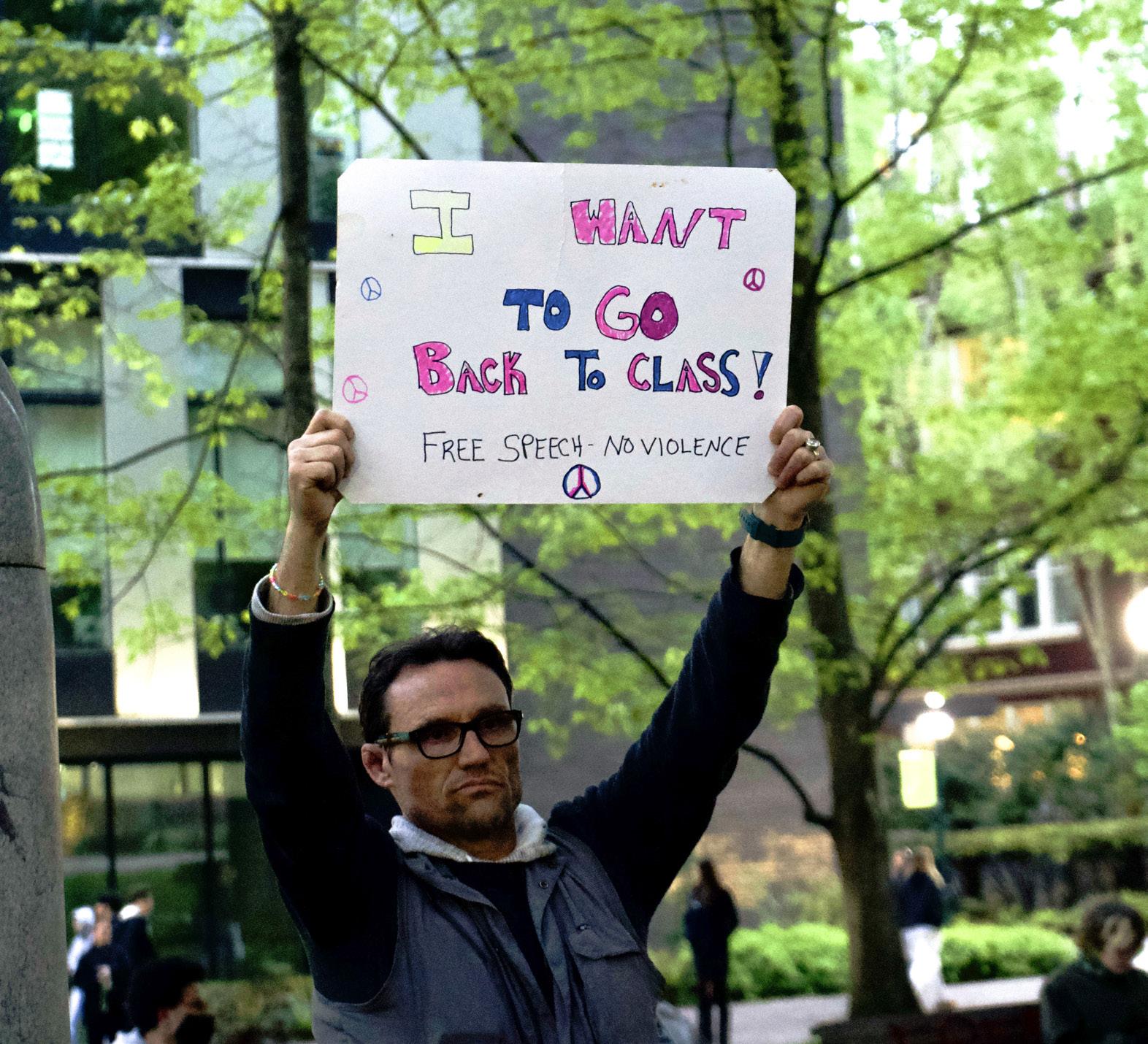

The occupation of Branford Price Millar library at Portland State, affiliated protests around campus and the administrative responses to those protests have affected nearly everyone in the PSU community in some way. We at PSU Vanguard recognize that not all perspectives, nor all communities impacted by these recent campus events, are represented in the following coverage. However, PSU Vanguard has made an extensive effort to seek out a range of perspectives about how these protests have impacted various communities around campus.
A repeated concern among many protestors, PSU faculty and students was police presence on campus. Many students cited the administration’s choice to involve the Portland Police Bureau (PPB) as a violation of their right to protest peacefully and an incitation of violence against students and protestors.
“Even trying to, like, return to class with this trauma of being disrupted by police,” said Arlo, a PSU graduate student. “I don’t fault anyone for not being able to come back to campus right now. And that is not something I attribute to the protesters in any way. And it’s entirely something that I attribute to my personal experience with the police being involved.”
“A lot of students, faculty and staff are in agreement with me on being horrified by the administration and the violence,” said Skylar, a student leader who attended the campus protests. “And so there’s a lot of solace in that, knowing that a lot of people feel the same way. And it’s also difficult to just go back to class—back to being a student—after being made unsafe.”
“A lot of the time that I’m on campus, I am able to connect with other students that are in agreement with the cause, experienced the violence last Thursday, and by connecting through word of mouth about that,” Skylar said.
Students have pointed to the incident in which a person had driven their car into the protesters as an instance in which the police presence could have mitigated danger but failed to do so.
“On Thursday, when we saw this car pull up, threaten students and then obviously assault with the bear mace, there was no intervention by the police in that moment,” Skylar said. “There was very little intervention once the person was arrested, and how can I be expected to feel safe on campus when that happens?”
The police presence proved particularly disturbing for students living on campus. Lark, a student who lives in Blackstone, was arrested during the height of the campus protests for crossing the perimeter tape line which police had set up on the steps of their dorm.
“It just got loud outside, and so I went down,” Lark said. “I was on the phone with my mom, because she was asking what was going on. And so I was out there and I went to just like kind of look at what was happening… long story short, [I] ended up getting arrested standing in the entrance of my dorm.”
Lark explained the police had situated the tape line on the dormitory entrance. “I, yeah, just got on the other side of it,” Lark said. “I didn’t have any intention of getting involved in the protest just because, as pathetic as it sounds, I had a lot of homework due.” Lark ended up being detained for eight hours.
Before PPB arrived on campus on Thursday, Campus Public Safety Office (CPSO) officers were on campus on Monday after a campus rally, escorting students from all closed buildings and classes. Basil explained they were in class when CPSO officers told the 60 students they needed to evacuate quickly, yet students were not informed what the danger was. “It was very intimidating, and it was the first time I felt unsafe on campus,” Basil said.
“To make matters worse, when I met up with classmates to arrange safe rides home I found out that one of my classmates was chased by the police on their way back from the bathroom and another was locked out of the building,” Basil said. “Had we been in real danger, PSU and PPB would not have protected us.”
Even for those students who were not directly impacted by the police, the protests or the administrative action in response to the protests, many still expressed frustration. With the campus closed, many classes canceled and the library unavailable, many students felt disenfranchised.
“I could have easily gone to class today, and there’s no reason to have closed the entire campus,” said PSU student Justin, during the campus closure. “It’s nonsense.”
Another student, Henry McDowell, expressed disappointment in the occupation of the library space. “Destroying the library hurts students at least as much as it hurts the administration, and students have a lot more to lose,” McDowell stated. “For the record, I support Palestine, and I believe Israel is clearly committing a genocide, but I cannot support what happened here.”
“The destruction is expensive and deprives our students of a critically important learning and study space,” said President Ann Cudd in a faculty senate meeting on May 6. “The unrest, destruction and vandalism of our university, it harms our reputation and hurts enrollment.”
A collective of Masters in Social Work students for Palestinian Freedom emailed their own fears and grievances with the school. Various students in the program felt frustrated with the admin-
istration, with one anonymous student mentioning that if they “had not already sunk so much money into their education, [they] would not be returning.”
The frustration reflects some students’ desire to no longer have connections to the school. “Following last week’s events and PSU’s continued refusal to divest from genocide, they have ruined their reputation as a recommended school from both alumni and current students,” the collective wrote.
“As the president of this university, in my view, we should not condone or accept a community that embraces vile messages that so deeply wound other members of our community,” Cudd said in the senate meeting.
Many Jewish or Israeli members of the PSU community have expressed feeling hurt, targeted and ostracized by the local protests and the library occupation. They point to some of the slogans and chants repeated by protestors and graffiti in the library as examples of rhetoric which they believe is actively perpetuating harm against their community.
“I don’t think that there’s a lot of nuance in the protester’s side about what antisemitism is, and about what their actions are that could be antisemitic,” said Solomon, a Jewish PSU student. “They’re not coming at it specifically to pronounce Jewish hatred, but the things that they are doing have an antisemitic effect.”
Jewish students and faculty at PSU cited specific instances of encountering hate speech and antisemitism during the recent protests on campus, including protestors celebrating Oct. 7, denying the atrocities which occurred on Oct. 7, calling to “globalize the Intifada” and calling for death to Zionists, among others.
“When you have those kinds of slogans said over and over and over again, it does begin to create an atmosphere of intimidation for one particular group on campus,” said one professor in the College of Liberal Arts and Sciences who wished to remain anonymous.
“I understand that people are upset about the fact that there is a horrific war going on, and that many civilians have been killed…” the professor said. “I understand why people are upset. I’m upset about it too. But to go from there to say this entire country doesn’t have a right to exist, and anyone who associates or affiliates it with it in any way should be condemned and essentially doesn’t deserve to exist… to me, that’s obviously antisemitism.”
There has been a repeated sentiment amongst many Jewish and Israelis peoples who have spoken with Vanguard that there is a desire to participate in Palestinian solidarity communally, but they often feel unsafe and unwelcome within the Palestinian activism environment at PSU.
“Thethingis,Iwanttobeouttheremarchingwiththemtoo,” Solomonsaid.“Iwantwartostop…butIcannotstandwithpeople whoarecallingformybloodtoruninthestreet,youknow?Ican’t. I can’t be out there and stand with people calling for Intifada.”
“It’sahostileworkplace,”SolomonsaidaboutthecurrentatmosphereatPSU.“Ihavetowalkacrosscampuswithpeoplewho don’tknowthedistinctionbetweenwhatthey’recallingZionism andwhatmyexperienceasaJewis…I’mlikeatalossabouthow do I go to school with a population that wants me to die.”
Arden—aJewishIsraeligraduatestudentatPSU—agreedthe rhetoricofcampusprotestshascontributedtoauniversityenvironmentwhichmakeshimfeelunsafe.“It’sveryunidirectional,” the student said. “It’s very aggressive. It’s very—it’s scary to be on campus and just see so much hatred be an acceptable form of expression on the campus.”
Ardendescribedalackofopencommunicationfromstudentledsocialactivism—andoncampusgenerally—thatisinclusive toIsraeliandJewishstudentperspectives.“Thefactthatpeople are unwilling to engage in a debate is what’s antisemitic about the situation,” he said. “There’s an assertion of our people and our history, and no interest in hearing from the people that the assertion is being made.”
This unwillingness to engage with conversation or academia fromIsraeliandJewishperspectivesisfeltintheJudaicStudies DepartmentatPSU.AccordingtoLorenSpielman—anassociate professor of Classical and Rabbinic Judaism—current enrollment in the program is at the lowest point in years, and flyers advertisingdepartmentcoursesareconstantlybeingtorndown.
The Jewish community on campus do not all relate to Israel or the campus protests in the same way.
“In recent times I have, however, felt alienated, not from the school, but from other Jewish students,” said Avery, a PSU student. “Many of them refuse to recognize any malicious acts perpetrated by the state of Israel, and treat any discussion or condemnation of such acts as Jewish self-hatred.”
“I have never felt the need to mask or hide my Jewish identity,” Avery said. “In fact, I feel proud to embrace it while sup-porting the people of Palestine. I would go as far to say that I feel much safer as a Jew around pro-Palestine protestors, rather than Zionists who would call my Jewish identity into question for daring to speak out against Israel.”
Lyric, another PSU student, reported “feeling safe and com-fortable” at the rallies held in solidarity with Palestine, and wanted to emphasize that “anti-Zionism is mitzvah,” mitzvah meaning a religious duty.
Joe—a community member who had been involved in proPalestinian marches in Portland was easily identifiable in the crowd wearing a kippah and laughed at the question of feel-ing unsafe at pro-Palestinian events “The only antisemitism I can think of has come from counter protesters questioning my Jewishness,” Joe said. Joe asserted there was no validity to antisemiticclaimsaboutthecrowd.
Meanwhile other members of the Jewish and Israeli commu-nity on campus asserted that all voices should be heard and in-cluded in discussions about antisemitism andcampusprotests.
“There are some anti-Zionist Jews on campus, and that definitely needs to be acknowledged,” said the Jewish College of Liberal Arts and Sciences professor. “But I think the majority of Jews generally—and probably the majority of Jews on cam-pus do feel some connection to Israel. They are hurting right now. And for that reason, they need to be listened to, just as they listen to members of any other minority group who said that there was some sort of systematic problem that was caus-ing them to feel marginalized and unsafe.”
In the immediate aftermath of the library occupation’s dis-persal, many student groups put out statements detailing their organization’s stance on the issue. Many were heavily critical of the university’s cooperation with the PPB, called for a divest-ment from Boeing and stated their support for the studentandPalestinian cause
These groups include explicitly political organizations such as PSU Cuba Solidarity, Disarm PSU, PSU Students United for Palestinian Equal Rights (SUPER), the Progressive Campus Solidarity Union and MECHA de PSU. However other organizations also put out statements, such as multiple cultural resource centers (CRCs) and clubs. These include Associated Students of Portland State University (ASPSU), Pacific Islander, Asian & Asian American Student Center, Native American Student and
Community Center (NASCC), Queer Resource Center (QRC), Women’s Resource Center, Student Sustainability Center, Pan African Commons, La Casa Latina and Learning Gardens Lab (LGL) graduate staff.
While Student Activities and Leadership Programs (SALP) recognized organizations and independent clubs were able to keep their statements on their social media accounts, many resource centers were allegedly forced to take their statements down after warnings from campus administration.
“The professional staff of the cultural resource centers received warnings from several people that our resource centers’ public statements made in the first and second weeks of May were in potential violation of university policy,” stated Remi, a student employee. “The warning given to the CRC admin argued that these statements were potentially in violation of university policy as they expressed what are considered ‘personal views’ on university platforms.”
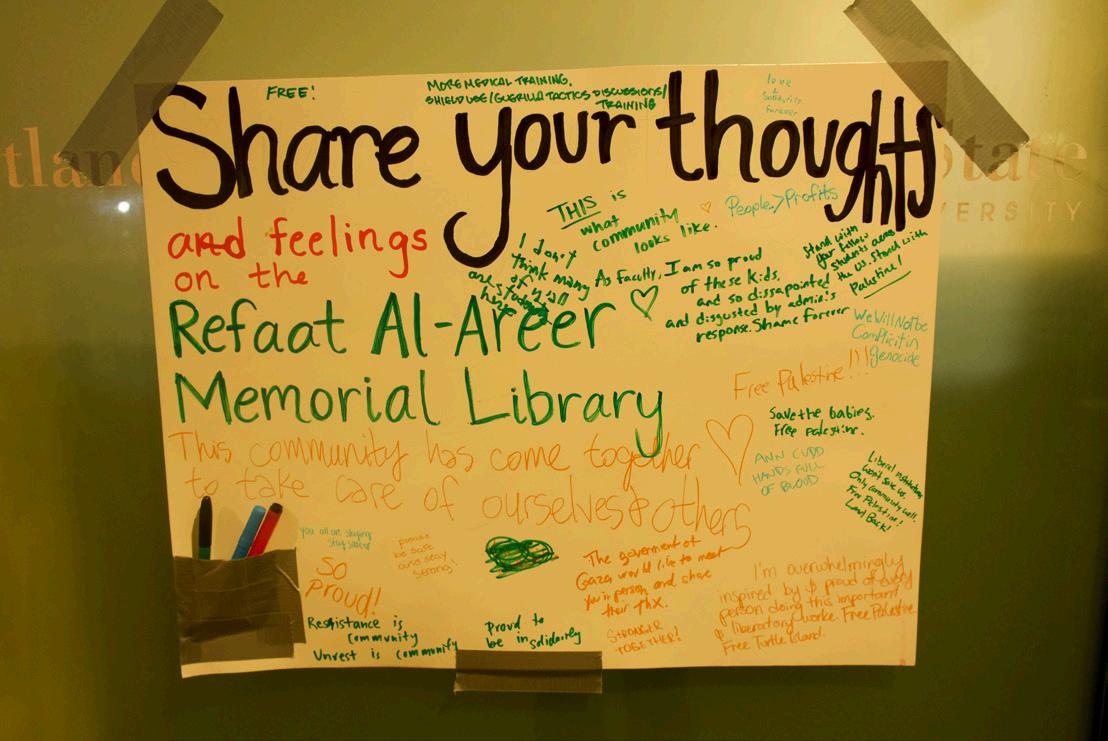
They also stated their belief that the administration’s response to these posts, in particular, is an example of a Palestine exception.
“In my own personal view, what is happening is an example of the Palestine exception, meaning the university administration is enforcing or warning that they will enforce policies that in different contexts they would not,” Remi stated. “Many of the resource centers utilize their platform to denounce other colonial situations, such as the continuing history of economic imperialism and militaristic intervention by US [United States] and European powers in the Global South and the genocide against Indigenous peoples and colonization of land in Turtle IslandAbya Yala. This is part and parcel of being educational centers. When these positions are taken within center programming, we do not receive similar warnings.”
Many student groups’ statements advocated for different things, but many echoed the same sentiments. PSU SUPER explicitly demanded the impending police sweep of the occupation be called off. “We at Super demand Ann Cudd and the PSU administration call off PPB’s planned ‘operation’ to mass arrest and criminalize protesters,” SUPER stated. “Cudd must recognize the right of all students to perform acts of civil disobedience in opposition to genocide without the threat of criminalization by PPB. We condemn Cudd’s decision to criminalize the students engaging in said protest. Involving them [CPSO and PPB] in this operation will only escalate the situation further, possibly leading to casualties.”
Many organizations’ statements made an apparent effort to center issues around Palestine in their statements, as LGL graduate staff made very clear. “Throughout the course of the protest, Ann Cudd and the PSU administrators have ignored and sidestepped the issue of what the protest is about; genocide in Palestine,” stated the LGL graduate staff.
The NASCC echoed this statement. “We also take issue with President Cudd’s language in using the term, ‘war in Gaza,’” NASCC said. “A state military’s extremely disproportionate use of force against civilians is not a war at all; it is a slaughter.”
MECHA de PSU’s statement went further. “MECHA de PSU stands in complete and unwavering solidarity with the Palestinian liberation movement resisting the ongoing occupation of their land by the settler-colonial project of Israel,” MECHA de PSU said. “We demand Portland State University cut ties with Boeing, disarm our PSU campus, and call for an immediate, permanent ceasefire in the genocidal war on Gaza. We encourage all MECHA members, all Latine students, and all allies to join the global student intifada, to voice our movement’s demands and to organize to build a sustainable and productive student movement that combats the root causes of our struggles and builds safe community-centered alternatives.”
Statements also included words of support for the student protesters. For example, ASPSU’s statement read, “We join the voices of student protestors in their demands for the PSU admin to call for an immediate ceasefire, cut ties with Boeing, sever connections with any other entities profiting from the war in Gaza.”
Another student group, PSU Cuba Solidarity, stated, “We stand with the student protestors who used their voices to demand for PSU admin to call for an immediate ceasefire and cut all ties to Boeing and other entities that profit from the ongoing genocide.”
Other statements also came with actions reflecting a hostility added with police presence on campus. The QRC canceled this year’s Queer and Trans Student of Color Conference, noting explicitly that “we are canceling the event to call attention to, honor, uplift, and shift our focus to the voices fighting for liberation of Gaza and the Palestinians people - recognize that our coexistence is inherently linked.”
As for the students involved in the protests, the concerns of academic or legal repercussions ultimately did not outweigh the social or political change they were advocating for. “I do think that there is definitely a threat of us being expelled, of us being removed from campus and of them trying to stifle the movement for liberation,” said one member of the Portland Revolutionary Student Union group. “But it doesn’t matter. I don’t care if I’m expelled, I don’t care if I die. We are here to fight for liberation, to fight against the genocide of the people. My life is nothing.”
Phoenix—a Palestinian-American student involved in the campus protests—explained that, for them, the protests were a logical response to the university’s immoral actions. “You invest in a death cult in Boeing,” they said. “And we are not paying for it. $30,000 worth of tuition for us to invest in the massacre and horrific murder of a defenseless civilian population.”
“I can’t speak for the entire student body, but for me as a Palestinian American student,” they said. “This goes against everything and you guys are murdering my family.”
Other protestors acknowledged a global interconnectedness within their cause. “Free Palestine, this is about land back, and giving Indigenous land back to Indigenous people across the whole world, in the U.S., in the Philippines, in Palestine, in Puerto Rico,” said Jane, a PSU student.
Other students spoke about the mutual support and local community building which took place during the protests. “I’ve been really proud of students for showing up,” Arlo said. “Everything I’ve been seeing has made me really proud of people’s direction, of the objectives and of how people are bringing themselves into the space and to the conversation.”
“That is the community culture of PSU that I value, and is keeping me here in spite of the disingenuine responses by our president and by campus police and Portland police,” Arlo said. “And the vulnerability that people are bringing to show up because it is not done impulsively or lightly to go into a space knowing that police can be weaponized against you, and in such force.”
Another PSU student, Glasses explained that even though the encampment on campus was a punishable form of activism, it was a more effective form of protest because it allowed the protestors’ message to be widely heard without disruption or manipulation from outside actors. “Encampments like this traditionally are good because they are loud,” the student said.
“They bring active attention to an issue that needs attention and often it makes it a lot harder for media or corporate owned media to suppress these stories, because if it is in a place where people regularly will just walk by and notice that means that it can’t be suppressed as well because it is going to be traded through just first hand accounts, word of mouth and on social media,” the student said.
Skylar believes the actions of the protestors at PSU—and even the administrative response to the protests—will act to strengthen and expand future interest in student activism at PSU. “I really think this is a powerful moment for organizers in the movement to be able to capture anti-imperialist sentiment,” they said. “And I think at PSU, more and more students will get politically involved. More and more PSU students will get radicalized by the radical actions of the university, in calling in the police [and] in allowing them to brutalize students.”
“The administration and police’s attempt to silence us, to squash this movement won’t work,” Skylar said. “And more and more people are gonna get involved in actions moving forward to challenge and resist the university’s relationship to war profiteers.”
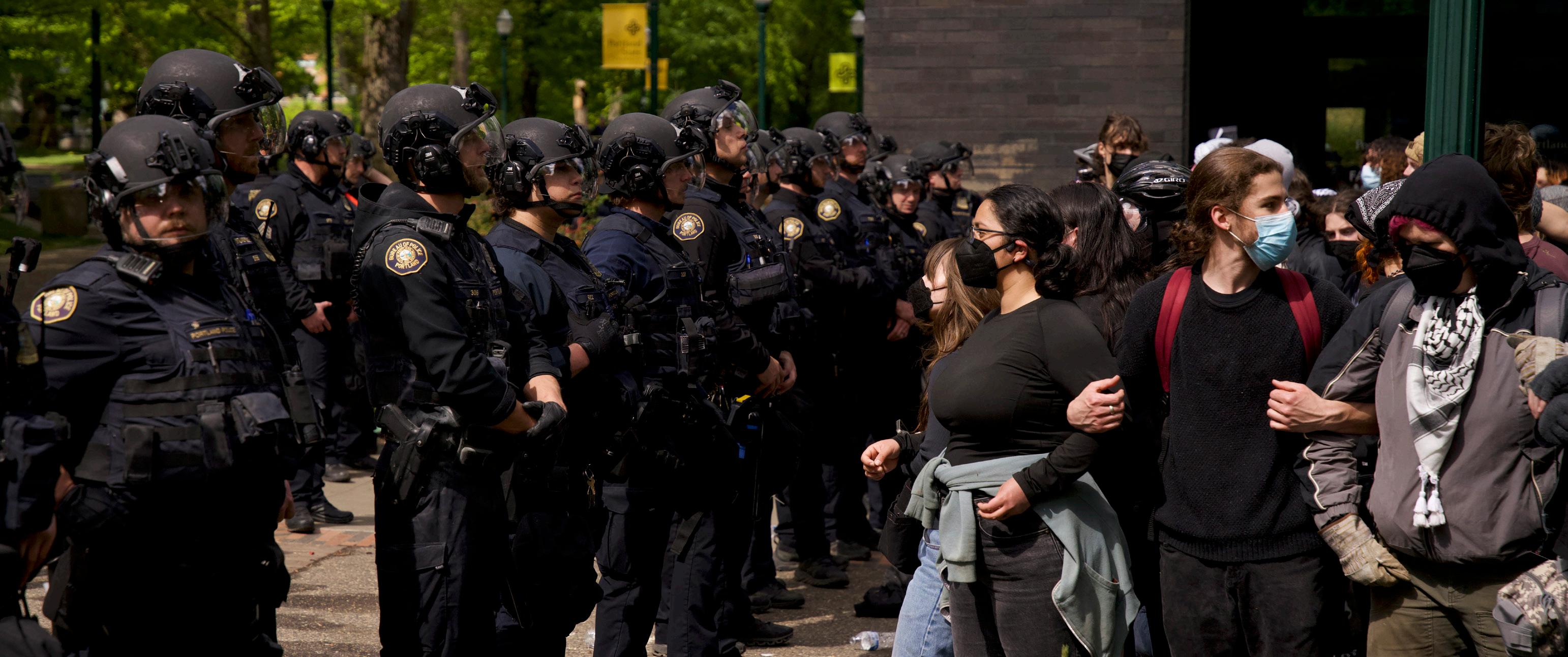
Just before 6 a.m. on Thursday, May 2, Portland Police Bureau (PPB) cars drove onto the Portland State campus and surrounded the Branford Price Millar Library, creating a perimeter which took over the block’s radius. One sound truck—an SUV with a bullhorn mounted atop—parked in front and blasted the following message:
“By request of Portland State University, the Portland Police Bureau is ordering you to leave Millar Library, and the South Park Blocks are now closed. Failure to leave the library and the South Park Blocks will subject you to arrest for second-degree trespass… Leave the south park blocks and the building by using the main front library exit. Leave now.”
Pro-Palestine protesters had gathered on campus grounds off and on from Thursday, April 25 through Thursday, May 2, occupying the library from Monday, April 30, to May 2. Their demands included a list of 13 objectives for the university to agree to. The occupation incurred the invitation of PPB despite concerns voiced by the faculty and students about the safety of the campus community.
On May 30, PSU President Ann Cudd opened up secret negotiations with protesters occupying the library, with facilitation by three faculty members: Professor Stephanie Wahab, Assistant Professor Molly Benitez and Senior Research Assistant Colleen Carroll. Having earlier united in the shared goal of acting as a bridge of communication between students and administration, the three reached out to Cudd and the students inside the library to offer assistance.
During the negotiations, they served as liaisons between the two groups.
“I think it’s just really important to make it clear that we were not working alongside the administration,” Carroll said. “We were neither working alongside the administration nor working alongside the students, right? There’s a different third role.”
Negotiations between student protesters and administrative staff have also played a role in other universities, as campus protests have cropped up across the United States. Other universities—such as Columbia University and University of California,
Los Angeles—have faced university presidential sanctions due to police raids on encampments.
Not all have incited a forceful police presence, however. Four universities have prevented escalation through negotiations with student protesters, acquiescing to some demands and making promises to work on others according to a recent article by NPR PSU students involved with negotiations on the protest side claimed their goal was simple.
“We just wanted Cudd to put in writing that she would meet our demands,” one student protester said. “We knew divesting from Boeing wasn’t going to happen overnight. We just wanted her written word that the process would begin.”
The library occupation came just four days after Cudd publicly announced PSU would temporarily pause donations from Boeing. In a March press conference, Cudd said that, despite considering student complaints, the university would not cut ties with the company. In her April 26 email, Cudd also proposed a town hall meeting where students would be invited to debate the issue.
In response, student protesters referenced how a town hall which the Associated Students of Portland State University (ASPSU) Senate initially helped set up for PSU Students United for Palestinian Equal Rights (SUPER) to meet with the Board of Trustees earlier in the year never materialized. They also mentioned PSU had already received funding from Boeing for the current fiscal year, as PSU accepted the last donation on Sept. 12, 2023.
PSU receives around $28,000, for which the company provides PSU annually for scholarships and emergency funds
“A ‘pause’ does not meet the demands that we listed for the university,” said one of the student protestors involved in the negotiations. “This is passivism disguised under the lens of continuing discourse… We have no reason to believe a debate will change her mind after months of student action hasn’t.”
By midnight on April 30, Cudd had drafted a negotiation contract for the protestors to sign. In it, PSU students occupying the library were guaranteed they would not face academic repercussions for their actions and the university would not press criminal charges. The contract stipulated they hand over their names
and student ID numbers to the administration. The contract made no mention of the protesters’ other demands.
The student negotiating team refused to sign the contract, because it failed to meet their demands, and handing over their identifying information without a guarantee of legal amnesty presented too many risks.
“Some of the concerns that we heard was an inability to trust what the administration was saying,” Carroll said. “The requirement to collect student names felt unacceptable, and there could have been alternatives to that. Unfortunately, that didn’t happen.”
The faculty members claim they spent most of the night making constant attempts to stall the administration from bringing police onto campus, citing instances and statistics of police violence to prevent Cudd from making the call.
Wahab referenced the charged history of police on campus with the shooting of Jason Washington by PSU police officers in 2018.
“It’s not just like we don’t believe in the police,” Wahab said. “It is that the police have killed somebody on our campus. There is a history that lives in people’s cells and memory and hearts, and it’s a wound that is still so open and tender on our campus.”
However, to the triad of faculty messengers, Cudd’s decision to involve the police seemed imminent.
“To us, it seemed inevitable that the police would come,” Benitez said. “She had already turned it over to them. She said multiple times [that] she trusted them to not hurt people. At some points she was just like, ‘well, what else is there? What else is there other than the police?’”
According to the faculty members, the administration considered meeting the protester’s demands entirely off the table.
After the negotiations fell through, the student negotiation team occupying the library and the administration had no further contact—nor did the administration and the faculty members who had served as liaisons.
At 4:15 p.m. on May 2, Cudd emailed the PSU community, bringing attention to the no-longer-secret negotiations. In it, she stated, “I negotiated with students, with the assistance of three faculty members.”
“We didn’t have any power,” Carroll said. “No power was vested in us to make terms. We were ferrying messages between people.”
Students and faculty stated their greatest concerns about involving the police on a wide scale were the safety risks this would bring to students and other demonstrators.
“I have limited—but some substantial—concerns to the fact that police as an occupying force are generally not for the safety of the people,” said a student protestor who goes by the nickname Glasses. “My main concern is the specific safety of people because the police in Portland have a tendency to overreact and be over-violent like a lot of police bureaus in the country.”
Police used a variety of crowd control tactics during the initial raid of the library and subsequent protests. On numerous occasions, police pushed forward into crowds of protestors, knocking them to the ground. Reporters recorded several instances in which three or more officers knelt on the backs of individuals in order to arrest them.
In one instance caught on video by Vanguard, police randomly selected a person from the crowd of linked arms and dragged them into the cloud of a smoke grenade before throwing them onto the ground. They then lifted the individual up and arrested them. Tactical smoke rose in the background as individuals standing nearby were threatened by officers with pepper spray and paintball guns to back away.
One woman—a student—received bruising and abrasions to her breast when a police officer reportedly reached under her clothing while trying to pull her to the ground. Fellow protesters reported immediately after seeing the same officer repeatedly striking a Black PSU student in the face until he was pulled off by another officer.
Several more protesters received pepper spray in their eyes. One student protestor—receiving a particularly bad amount of pepper spray—sat on the steps of the Native American Student and Community Center while fellow protestors poured what water they had into their eyes, screaming for one of the medics who had been on site of the library throughout the occupation.
A Portland Fire and Rescue medic crossed the street from the group of police to attend, assuming the call was meant for them. Protesters immediately shouted for the officer to go away, calling out still for a medic they were willing to trust.
Dr. Tom H. Hastings—a coordinator of conflict resolution at PSU and volunteer member of Portland Peace Team—described his and two other Peace Team members’ attempts at de-escalating agitated protesters in a statement to Vanguard.
“We mentioned that the cops were remaining calm on the surface, but this level of antagonism was very likely to affect them as humans who feel disrespected,” Hastings stated. “We asked the enraged protesters if they were okay stoking a response that would likely produce a lot of pain behind closed doors if the occupying young people on the inside of the library were arrested by cops who had been targets of hate and rage.”
He described some protesters scoffing while others softened in response.
One professor in the College of Liberal Arts and Sciences who wished to remain anonymous said that, despite the safety concerns posed by police for some, he understood the situation to call for it.
“Of course students have a right to be upset about the police being called in,” the professor said. “[But] I don’t see how it could have been otherwise, given that the library had been made into
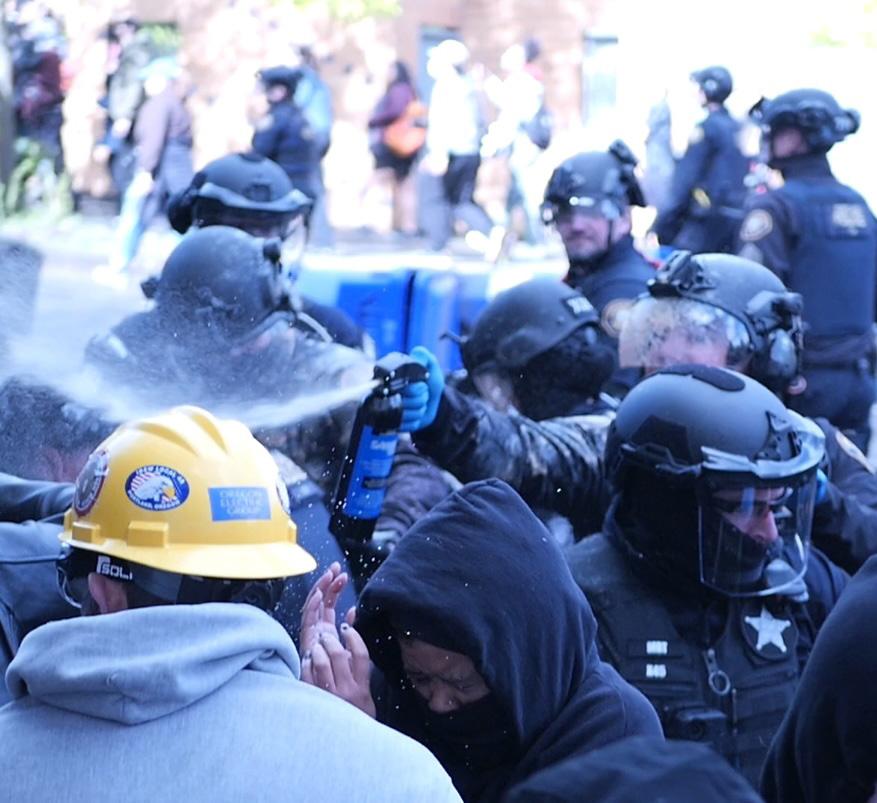
a fire hazard… The university was fearful for the students safety and had to bring that situation to an end.”
Cudd responded to questions regarding the administrative decision to involve PPB during a faculty senate meeting on May 6.
“To those who have condemned our action of bringing the Portland police on campus, I would ask this: how long should I have allowed the protest to stay in the library, which was quickly rendered unsafe as a fire hazard by the occupiers?” Cudd said. “How many times should I have offered students an opportunity to leave without consequences?”
Police made a total of 30 arrests that day, six of whom were identified by police as active PSU students. Vanguard has identified at least nine as being affiliated with the university.
In a statement, PPB claims to have arrested three individuals inside of the library, one of whom police arrested after they reportedly deployed a fire extinguisher at an officer.
Around 9 a.m. on May 2, about 28 protesters exited the front doors of the library carrying garbage can shields and umbrellas, running toward the crowd in what appeared to be an attempt to escape the police. Many of the protesters were able to avoid the police, however, one protester was forcefully apprehended by officers.
In a video captured by Vanguard, the protester was seen running toward the crowd when an officer came running into the protester’s trajectory, striking the protester’s shield and knocking them down. Several officers then came to the scene and assisted the striking officer in carrying the protester away and zip-tying their hands behind their back.
Sergeant Kevin Allen said in a PPB press conference later that day the arrest occurred due to the protester striking the officer, resulting in their arrest.
A majority of arrests occurred on SW Broadway during protesters’ efforts to prevent police custody vans from taking away those already arrested. Police further arrested protesters during the demonstration, which continued at the police perimeter of the library and South Park Blocks throughout the remainder of the day.


On May 9, demonstrators held a smaller encampment in front of Hoffman Hall. Protestors set up three tents in front of the building around 9 p.m., inciting a police response within 30 minutes.
A team of approximately 20 PPB officers entered the premises, taking down and confiscating tents. Protestors responded by moving toward the police, eventually prompting police to abandon tents and retreat. PPB Central Bike Squad and vehicular PPB brandished pepper spray and took photos of protestors on their phones, driving over a tent as they left.
The following day, Cudd claimed responsibility for calling the police, citing tents in a campus-wide email as a violation of university event policies.
Protesters rejoined on campus the evening of May 10 at the Walk of Heroines. Shortly after, PSU Alerts sent out a campuswide notification about an incident on campus, warning students to shelter in place.
Some students have found the use of alerts excessive—including those issued during the library occupation. One such example is the PSU Alert issued on May 1 which warned of “Police Activity in the South Park Blocks” despite no police presence seen in or around the area at the time.
Arlo, a PSU graduate student, expressed incredulity at the frequency and content of the alerts.
“Even the security alerts were weaponized to instill paranoia, fear, reactivity, insecurity and to direct that towards the protesters,” they said. “Because if it was about genuine campus safety, there would have been information. There would have been action That’s just so wildly irresponsible and incomprehensible to me, because I don’t know what the procedure for putting out a campus alert is.”
PSU’s Campus Public Safety Office (CPSO) sent an email on May 11 regarding the PSU Alert sent on May 10. In it, they stated CPSO had exercised “an abundance of caution” out of concerns of another potential occupation of the Parkmill building. Protesters continue to host rallies and pro-Palestine community events on campus, as the university has yet to respond to student demands since negotiations broke down on May 1.
“I have had to grapple a lot with whether or not I can continue studying under an institution that is so willing to deploy police on students to protect property while violently assaulting students,” Arlo said.
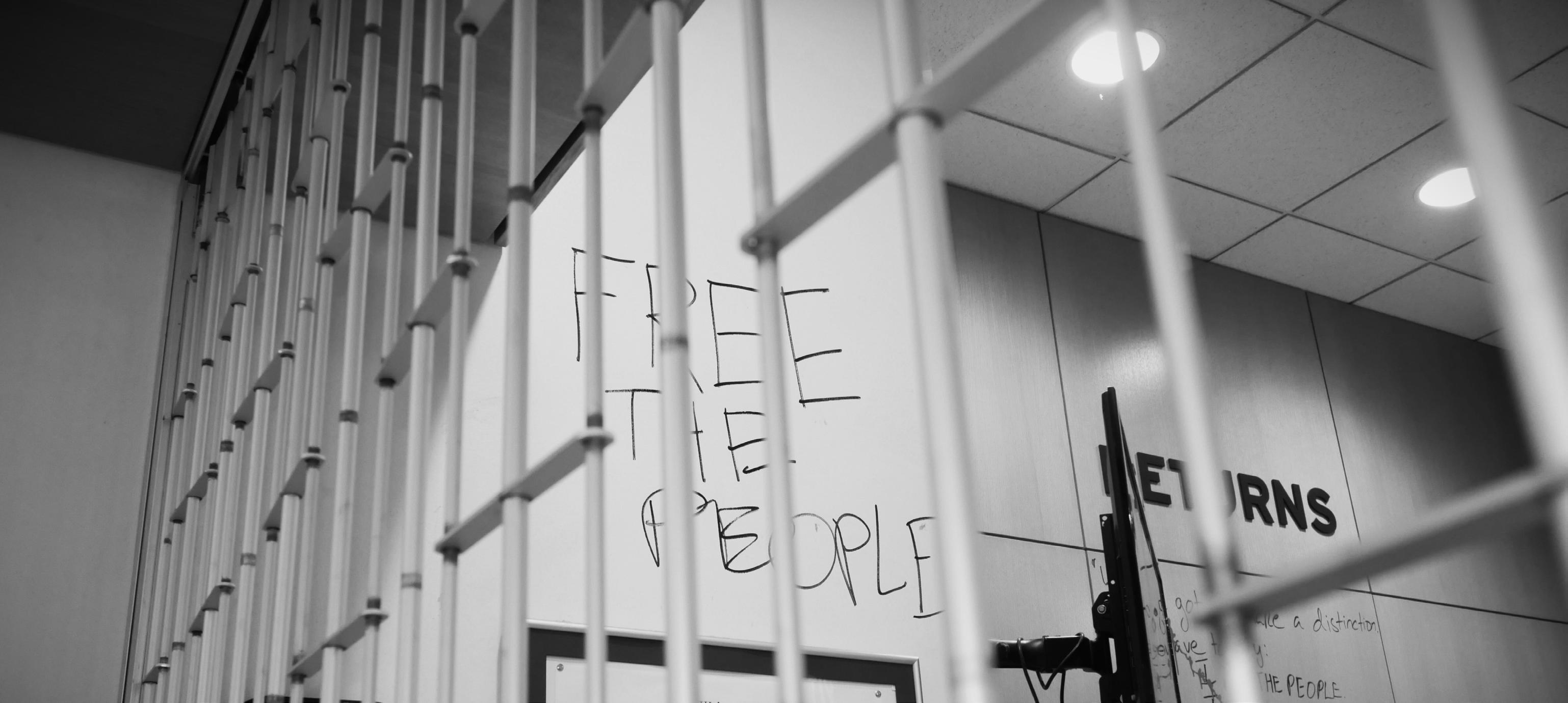
Protesters intentionally broke into the Branford Price Millar Library—renamed the Refaat Alareer Memorial Library by the protestors—on Monday, April 29. This began an occupation that would last until the early hours of Thursday, May 2 when the Portland Police Bureau (PPB) cleared the library, arresting several protesters. Portland State President Ann Cudd issued a statement on May 3, explaining the library would likely remain closed for repairs until the fall 2024 term.
“We put a really big importance on making sure we were all there for the right reasons, and that we were all united, and that we respected knowledge, because knowledge is power,” said one protester by the name of Quinn.
The protest—led by students and supported by non-student organizers—sought to draw attention to global issues while advocating for non-violence. However, despite their intentions, the occupation significantly damaged the library and its resources. According to organizers Ember and Robin and from what the PSU Vanguard staff witnessed during a tour after the occupation, most of the damage was extensive graffiti.
However, several computers and vending machines were also broken, and the fire alarm system was rendered unusable. Within a week, the university restored the fire suppression system and turned it back on. On Monday, May 15, the Office of Information Technology did a walk-through and is still in the process of assessing the damage to the equipment.
The library’s insurance policy contains a $100,000 deductible, and Emery said they plan to use the coverage fully. In a press conference with Cudd on May 15, she discussed the costs of the repair, “We have an initial estimate of $750,000 in damages to the building, but this does not include any of the technology systems or furniture that have been destroyed,” she said. “So I expect the full estimate to surpass $1 million.”
On Thursday and Friday, protestors tried to camp in the park blocks but were swept by PPB each time. After the sweep where PPB came and tore down a few tarps and removed a few tents around 3 p.m. on Friday, April 26, protesters moved to the library steps and created a barricade on the right side, with the
left side remaining open to anyone who needed to access the library. A pro-Palestine rally in the park blocks had prompted the administration to close the library at noon on Monday, April 29. According to Ember and Robin, protesters later gained access through the library door, which caused a security camera to fall and break a window.
According to the organizers, most of the damage—besides the graffiti—occurred within the first hour, including the broken computers, vending machines, etc. After that, a protocol was established to keep peace within the library. Patrols ensured people didn’t go to the higher floors, and people who caused problems or damaged property were warned or kicked out.
The organizers explained the occupation was run by horizontal leadership, with no formal leadership positions other than the medics who set up a medical tent in one of the study rooms on the first floor. Some of the medics possessed formal training, while others did not.
“There weren’t specific roles,” said James, one of the protesters. “I think in a capitalist society you are taught that people don’t act selflessly, but that was not the case here. Everyone was willing to help out where they could. Some people were even cleaning the bathroom out of their own accord.”
According to James, student use was still encouraged by the community during the protest. “What’s happening here today is no different than when students come in anyway,” James said. “It [the library] looks a little bit different… We may be wearing different clothing, flying a different flag. But the point is, these are still your peers here. You may not recognize them, but nothing has changed. We want what the university wants. And we want people to be able to foster their education here. And if you need absolutely anything, you can talk to absolutely anyone, and we will find the right person for you to get your needs met.”
James explained housekeeping was a unanimous effort and protesters began cleaning immediately, noting they aimed to respect the space and incur minimal damage.
“We want to respect your space as students and we’ve made
sure that any damages incurred have been cleaned,” James said. “We do want to make sure that we are separate from the people who would do evil while we are trying to show so much love.”
In a Faculty Senate meeting on May 6, Jill Emery—Collection Development & Management Librarian and Professor—said she and other library staff are appalled their built environment has become the backdrop of such destruction.
“We’ve heard from colleagues and students that the vandalism in the library depicts such vitriol and hatred that they’re not sure they will ever feel safe in it again,” Emery said. “Further, as the only space readily open to all the Portland community by our own advocacy, we are now closed to everyone.”
Emery explained much of the discourse surrounding the library occupation and its impact has revolved around the building and the collections but not around the library faculty and staff, who have also been affected by the situation. Emery said she feels disenfranchised by the way the media and the campus community have been ignoring the people who helped create and maintain the library.
“I don’t think I’m alone among my library colleagues in feeling this way,” Emery said. “We’re not just invisible in all of this, but seemingly erased entirely in the media and the outside public conversations occurring around it. We ask that you not rely on the portrayals being made by social media pundits, the occupying factions and our local news outlets. We are well attuned to their intentions.”
Emery also echoed Cudd’s email stating the library will be open by fall. She explained this does not necessarily mean the repairs to the library will take until fall to complete or the library will not be open before fall but that this is merely a time limit. The timeline depends on what work facilities must do, she said. During the Faculty Senate meeting, Cris Paschild—Associate Dean of the Library and Head of Special Collections—explained this experience was particularly chilling for her since the library contains materials not covered by insurance, such as historical archives.
“We’re the home of a pretty significant archive for the commu-
nity of Portland, and that’s a lot of important history of people who’ve chosen to trust Portland State because of our mission,” Paschild said. “It was a pretty awful week as the archivist, overseeing that collection and trying to find out what was going on.”
Against advice from the administration, Paschild had entered the occupied library that Tuesday and spoke with protesters about the value of the special collections and community archives. “The people I spoke to were incredibly receptive to what I said,” Paschild said. “I felt that they were really genuine. They helped me move more items into a secured area, barricaded the space and assured me that they were going to try to keep other people out.”
In a separate interview with Vanguard, Paschild explained she returned Wednesday and saw the special collections had been barricaded, and graffiti had been written on the walls to “protect the archives.”
Paschild also expressed her perplexity with some of the damage done to the library, including the shattering of the door to the Thomas C. Bielavitz Graduate Student Collaboration Hub on the fifth floor, damage to plasma screens, the removal of fire hoses and disabling of the entire fire safety system.
In an interview with Vanguard, Emery said the phone and other equipment cords had also been cut in certain areas. Though most of the equipment is still there, she said they are entirely unusable.
Additionally, Emery said some Oregon state documents containing different statutes and laws were damaged and may require rebinding. With no commercial bindery in Oregon or Washington, they would have to ship these materials to Nebraska—an expensive process which Emery said could take months.
These materials were a necessary resource for a program started in the past year which connected prison inmates with higher education materials and other tools to better their lives while incarcerated. Since inmates cannot access electronic doc-
uments, physical documents are necessary.
Some protesters argued that the interruption of library services is insignificant when considering the violence civilians in Gaza have been experiencing for over 200 days.
“We cannot continue focusing on our own work while these kids die,” said Holden Demetrius, a PSU student and protester. “We are all having this issue across the students, the teachers and the broader community. We are hurting and we are not good with this war. We need to move together to make it stop.”
After police cleared the library, rumors circulated that many books had been damaged and the entirety of the Dark Horse comics collection had been stolen. Librarians have disproved the rumor, stating that the vast majority of books were not damaged and that the Dark Horse collection remains intact, since it was removed prior to the occupation.
“I was immensely relieved when we went in the building and saw how much of the stacks were okay and how much of how much was fixable,” said Rose Bosely—the Library Access Services Manager. “However, those books don’t do anybody any good if we can’t get to them. What people are emailing us asking for—what they’re calling us asking for—is in that building, but we cannot safely get to it. It could be a while, a long time, before we can. It is really distressing.”
Bosely said she wants to focus on what the library staff can do for students and faculty right now and they plan to build up their services until they can get back to normal.
Currently, Bosely said the library is operating a desk in Fariborz Maseeh Hall from 10 a.m. to 3 p.m. on weekdays where students, faculty and members of the public can go to ask library staff questions on how to return library materials they checked out prior to the occupation, general research questions and receive help with assignments. Bosely said
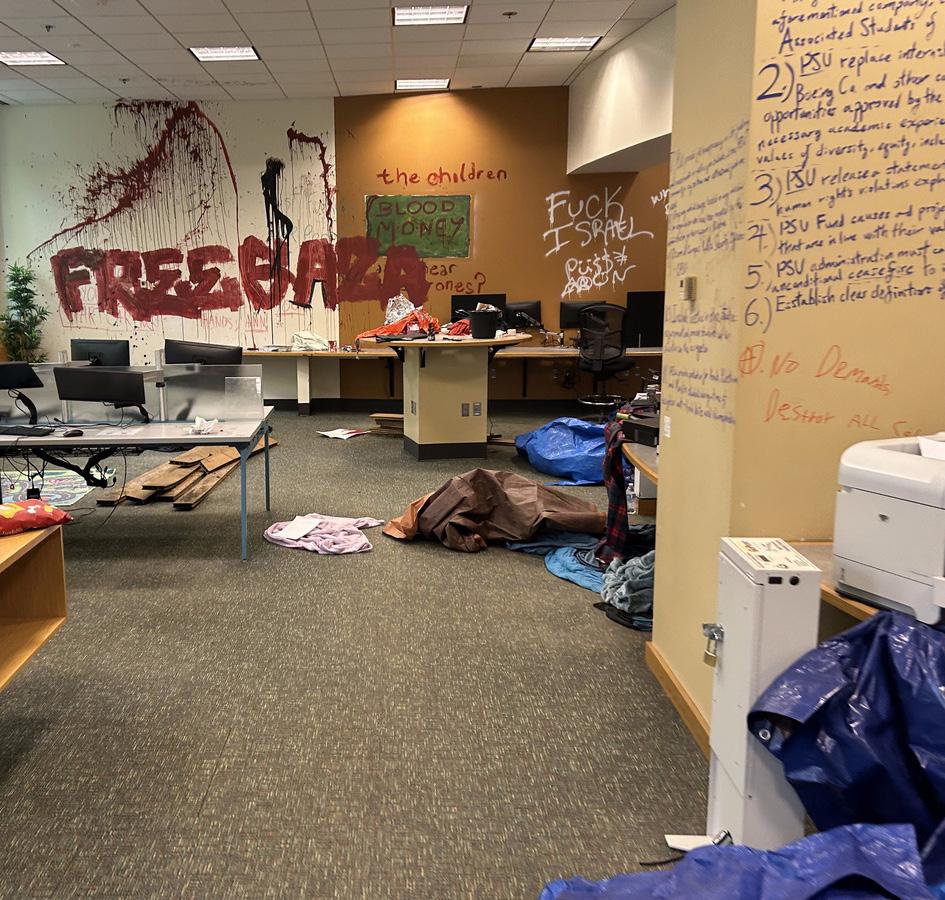
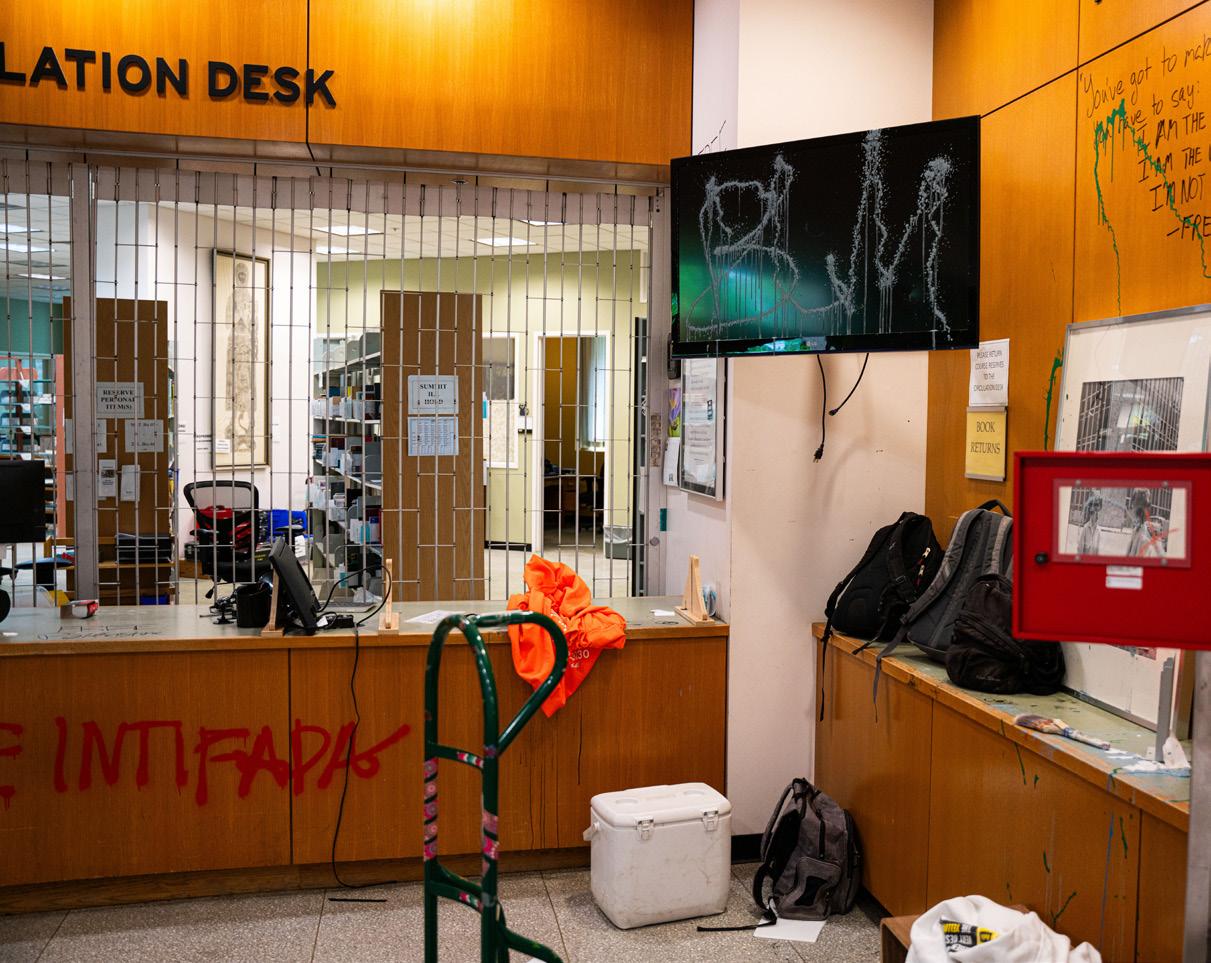
the only book drop still operational is the one on Southwest 10th and Montgomery. Anyone with questions should email circ@pdx.edu.
“We’re going to sit in disquieting solidarity to get through to the next iteration of who we are and how we work together,” Emery said.
Though the library’s physical damage was significant, all three librarians agree the real damage to this situation goes much deeper.
“Honestly, some of our most upset patrons are members of the public who could come to that library every single day, and we know them by name,” Bosely said. “A lot of them are very upset that their regular place is gone. That actually might be even more so, than physical damage to the building.”
Due to the fact that short-staffing is a campus-wide issue, Emery stated the allocation of resources towards library repairs would detract from what could otherwise be provided to students.
“It’s not just our labor,” Emery said. “It’s labor all across campus that now has to be refocused and redirected in this very specific way and that’s great, but we are short staffed across the whole entire campus and that means the resources aren’t going to students in the same way they used to. Because now the focus has to be working on this.”
As librarians and archivists, Paschild explained she and the rest of the library staff are invested in the importance of preserving shared knowledge and history. An attack on a library, Paschild explained, is an insidious tool which undermines culture and communities, sequesters knowledge and erases history.
“You can look at examples throughout history; it’s one of the go-to moves,” Paschild said. “And I know that wasn’t the intention here, but I think it’s hard to not have a very visceral response when you see a library taken over. I’m trying to reconcile that with my understanding of people’s intentions, people’s sincerity and their real concerns with that… symbolic impact.”
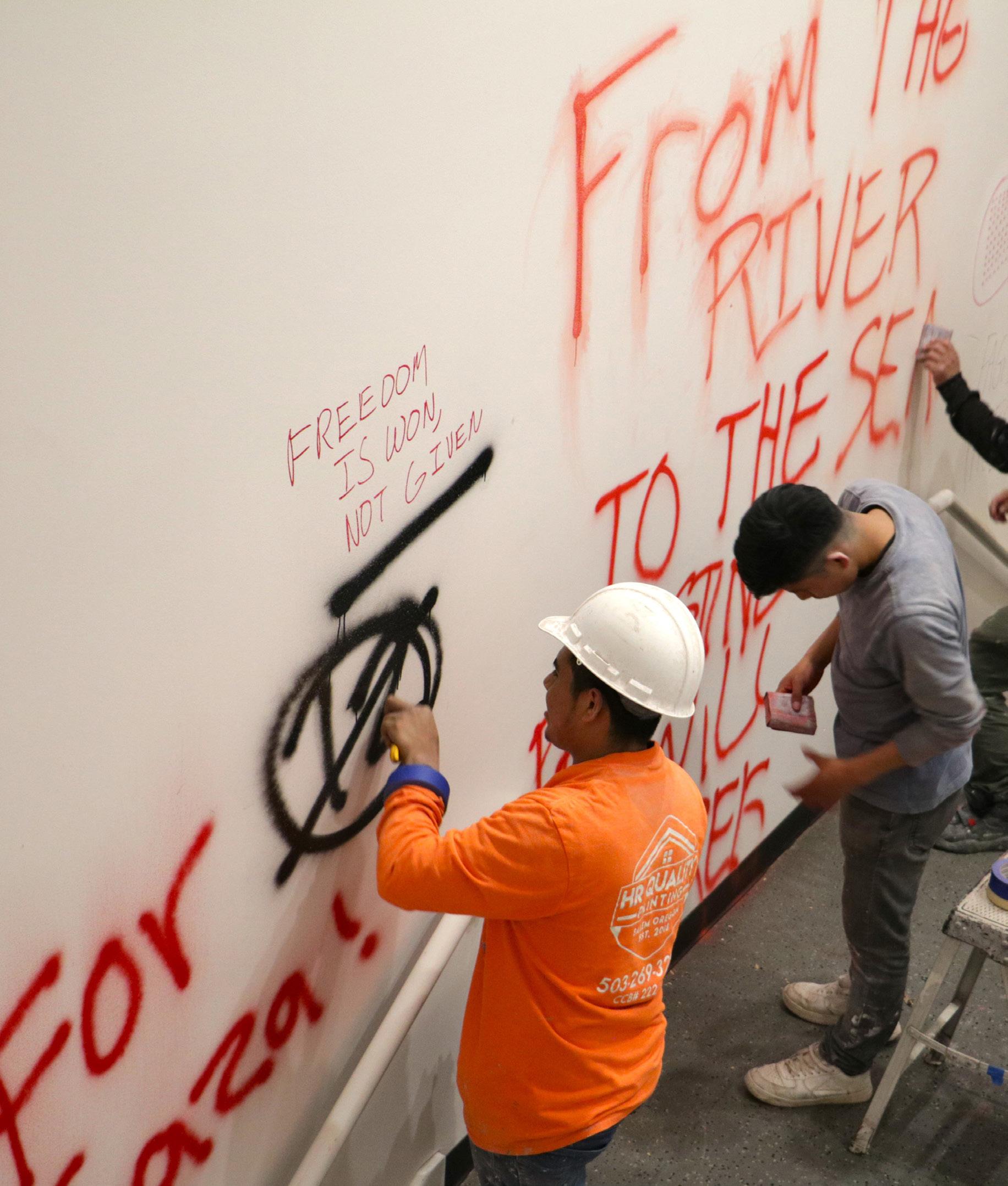

THURSDAY, APRIL 25
Around 6 p.m. — Students set up an encampment on the South Park Blocks.
• Park rangers set a public property curfew for 9 p.m.

TUESDAY, APRIL 30
6:04 a.m. — PSU Alert: Campus closed today, April 30, “due to ongoing incident at the library.”
• Secret Board of Trustees emergency meeting.
• Negotiations begin between Cudd and protestors, facilitated with the assistance of faculty.

8:57 a.m. — Around 28 people run out front with shields. One arrested.
9:05 a.m. — PSU Alert: “SHELTER IN PLACE
9:25 a.m. — A group of outside protesters moved behind the library where arrests were being made. There were small physical interactions between officers and protesters on the line.
9:26 a.m. — A Blackstone resident was arrested for standing outside the dorm.

FRIDAY, APRIL 26
Around 1:30 a.m. — Police swept the encampment around the South Park Blocks.
11:55 a.m. — President Ann Cudd emailed an update to pause receiving donations from Boeing.
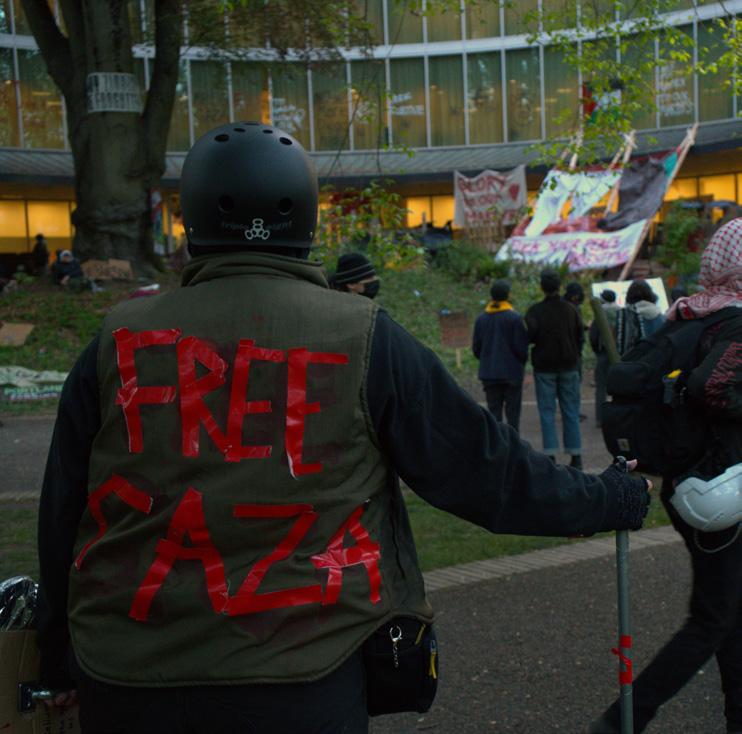
3:17 p.m. — Cudd email: overview of protest timeline, negotiations
6:04 p.m. — PSU Alert: Campus to be closed May 1 “due to ongoing incident at library.”
9 p.m. — Other protesters showed up. Protesters hold open mic night.

9:45 a.m. — Police vans holding arrested protesters began to drive off campus. Protesters moved into the street, preventing vans from moving. They go on for three blocks down SW Broadway from Harrison Street, where police vans exited campus, to the Interstate 405 exit just past Jackson Street.
10:35 a.m. — PSU Alert “Campus is closed.”
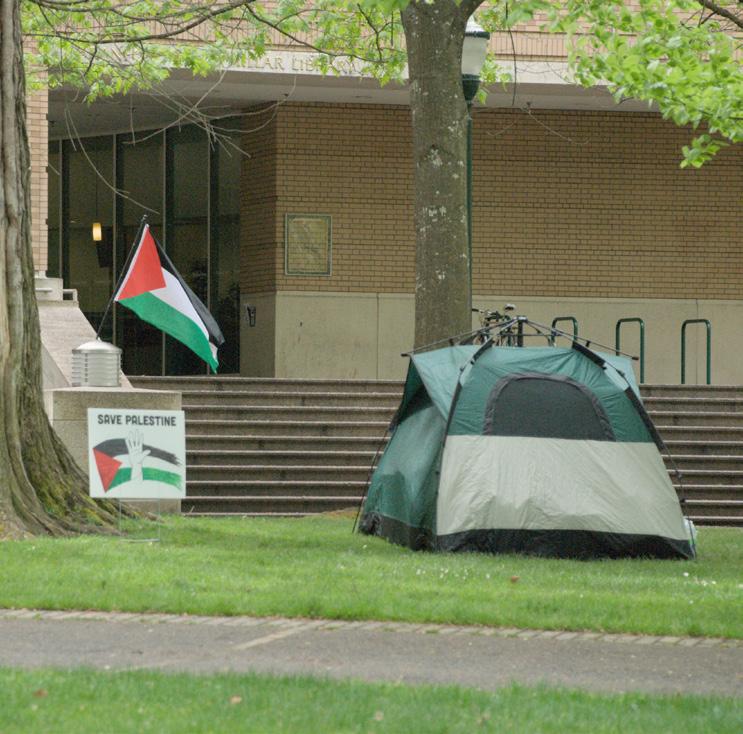
Around 1 p.m. — Protesters set up the first tent again on South Park Blocks.
• PSU Facilities remove bike racks and trash bins from South Park Blocks and surrounding areas.

WEDNESDAY, MAY 1
Around 12 a.m. — Negotiations broke down Told to leave if they did not want to face legal consequences. Some left at this time, most did not. 10:20 a.m. — Cudd emailed on breakdown of negotiations.
2:56 p.m. — PSU Alert: “PSU’s Millar Library is closed. NO ONE is authorized to be in the library. This includes all PSU faculty, staff, and students.”
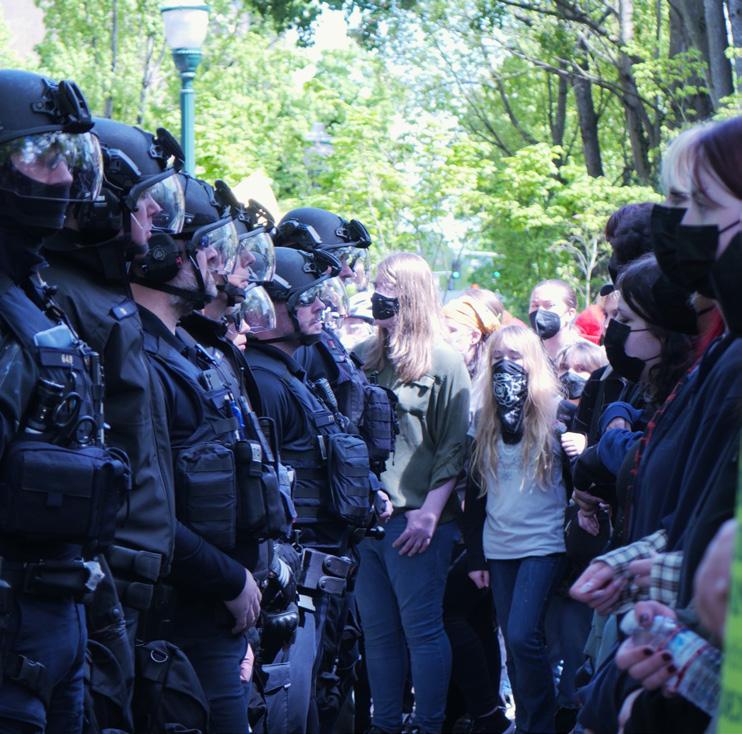
12 p.m. — Press conference with Mayor Ted Wheeler, Day, Cudd and Schmidt. 12:12 p.m. — PSU Alert: “The SHELTER IN PLACE for Montgomery and Blackstone Halls has ENDED”
Around 2:45 p.m. — Police move protesters onto Hall Street.
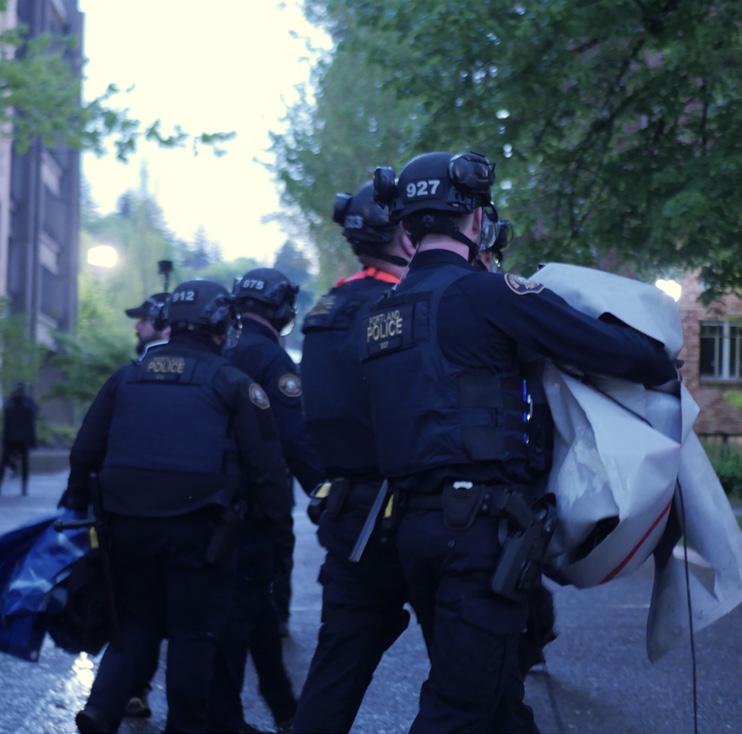
Around 7 p.m. — Portland Police Bureau (PPB) showed up in light tactical gear to remove small encampments and tear down the encampment.
• Protesters moved from South Park Blocks to the outside of the Branford Price Millar Library entrance.
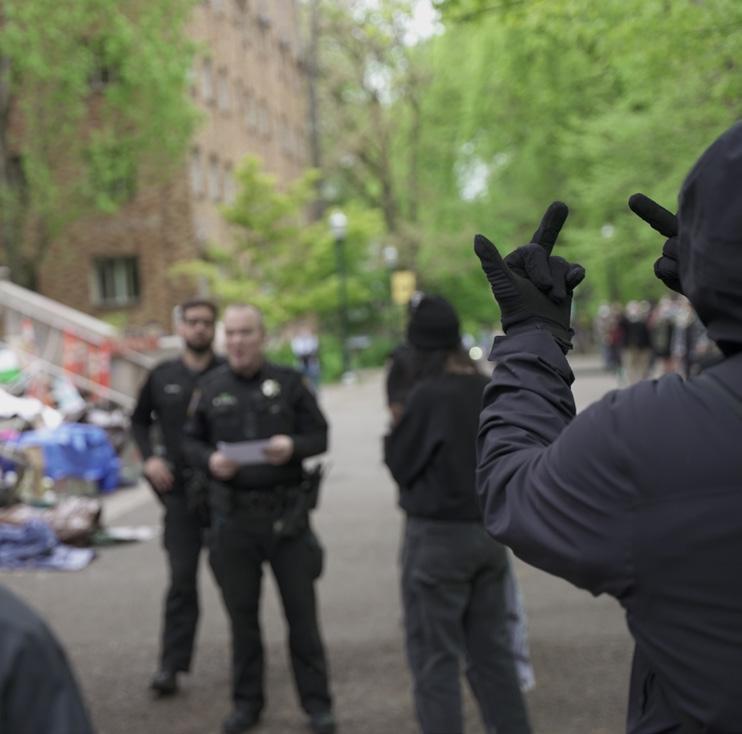
4:40 p.m. — Four PPB officers delivered a typed note to protesters that they needed to leave the library.
5:52 p.m. — Cudd emailed that campus would be open on May 2
7:26 p.m. — PSU Alert: “POLICE ACTIVITY at SOUTH PARK BLOCKS.” No police were seen in the South Park blocks at this time.
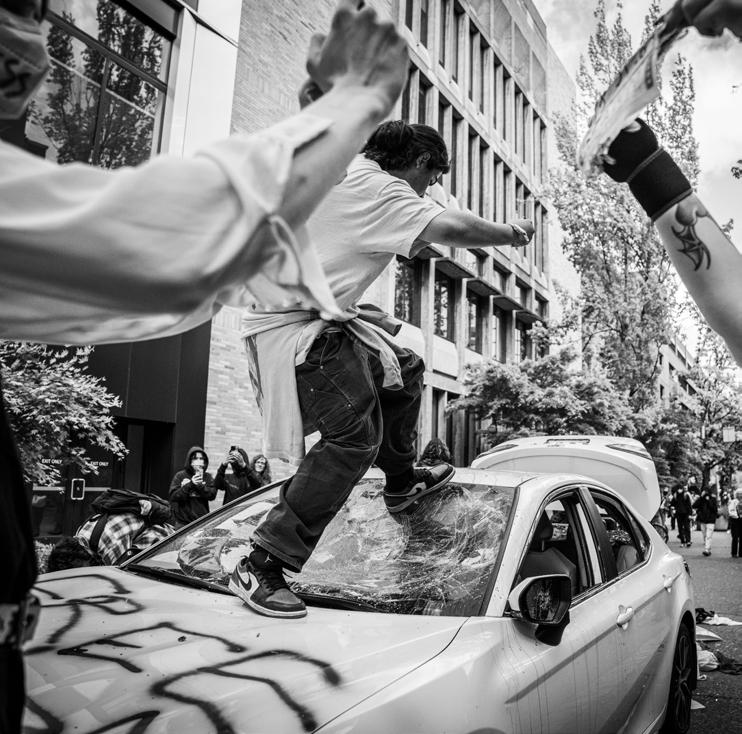
Around 3 p.m. — A white sedan drove into a crowd of protesters on Hall Street after posting “OMW @PSUVANGUARD [middle finger emoji]”
• The driver was arrested by police and placed on a mental health hold.
4:14 p.m — Cudd emailed, thanking the community and urging a return to campus.
• Protests continued outside of South Park Blocks.
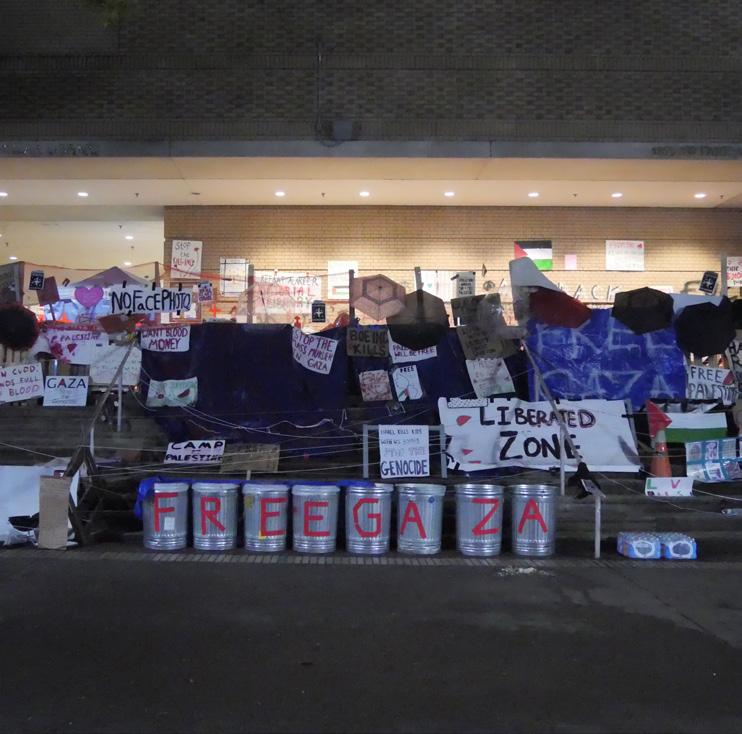
SATURDAY, APRIL 27
• Cudd communicated with protesters, agreeing that they could stay at the north entrance if they didn’t block the south entrance to the library so that the library could remain open.

9:30 p.m. — Block party with May Day protesters came to the front of the library and they had a barbecue. A few counter-protesters were in the crowd, caused some minor community tensions. Protesters from the library gave speeches to the crowd. The community initiated a die-in.
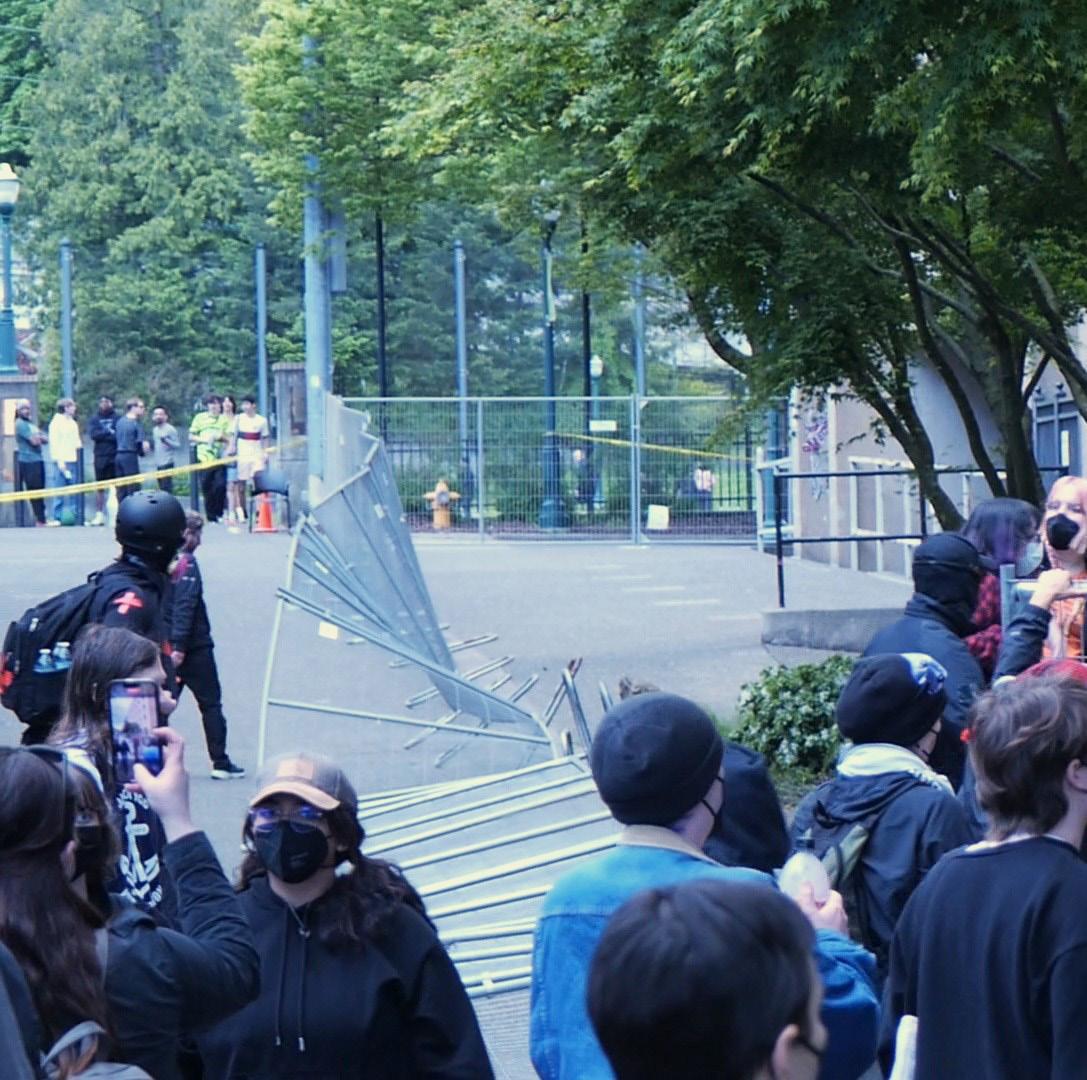
Around 6 p.m. — The library was temporarily reoccupied.
By 10 p.m. — Police announced the library was cleared for the second time. Eight more were arrested in this encounter.
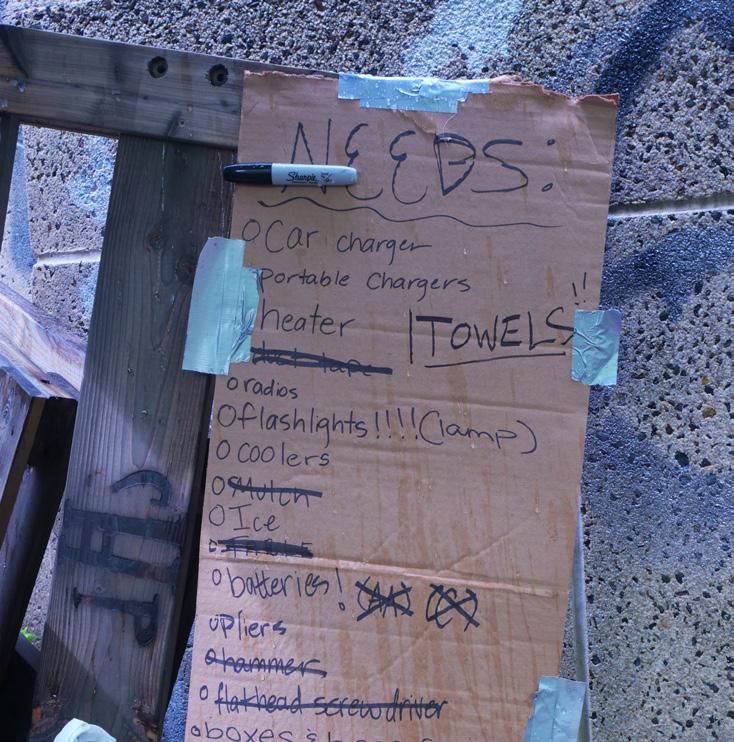
SUNDAY, APRIL 28
• Protesters placed a list of needed supplies outside the encampment. The protest remained largely quiet and peaceful. There were teach-ins and community events held.
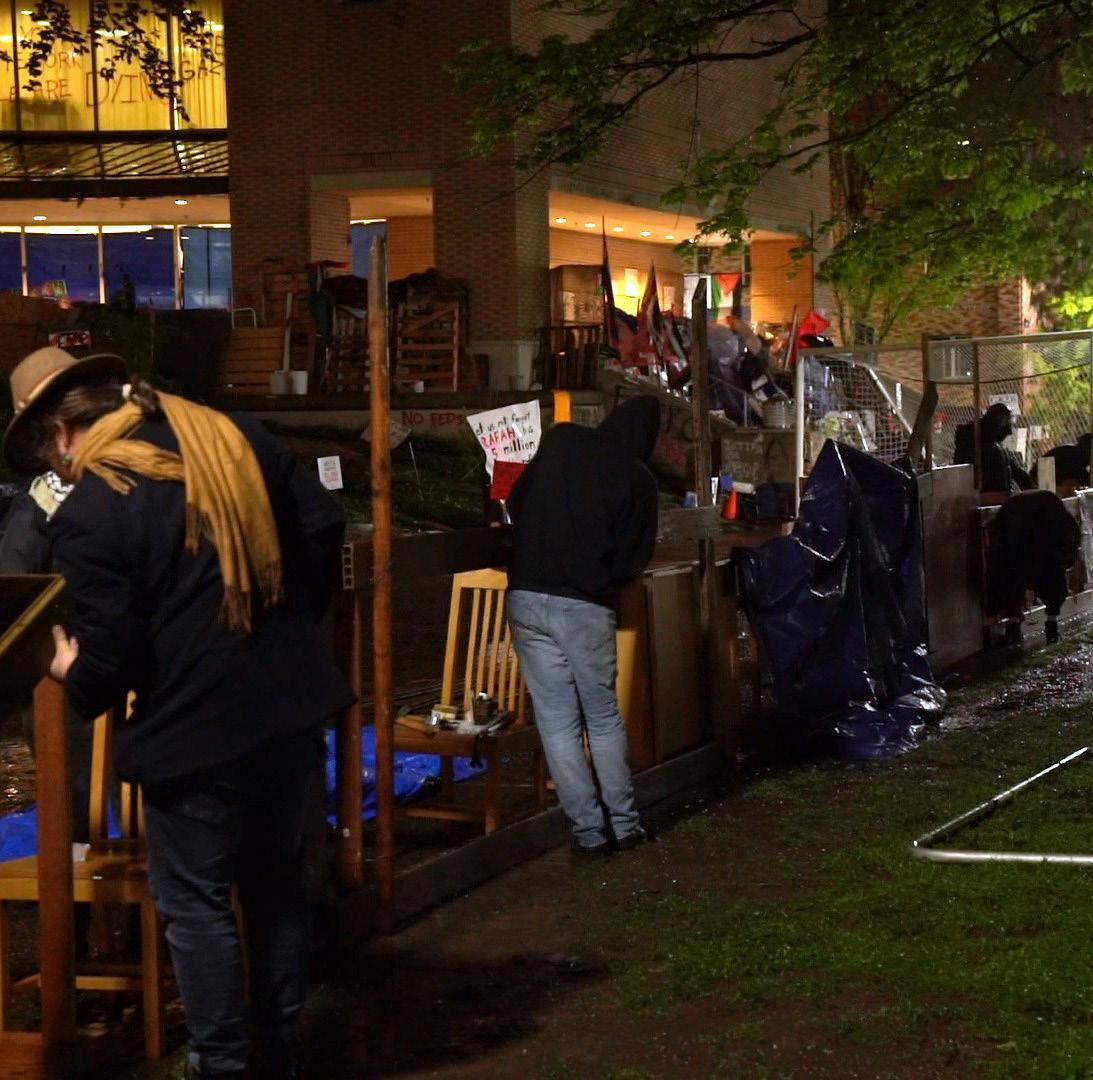
THURSDAY, MAY 2
4:01 a.m. — PSU Alert: “Millar Library is closed.”
4:17 a.m. — Protesters fortified barricades with wood, pallets, soccer goalposts.
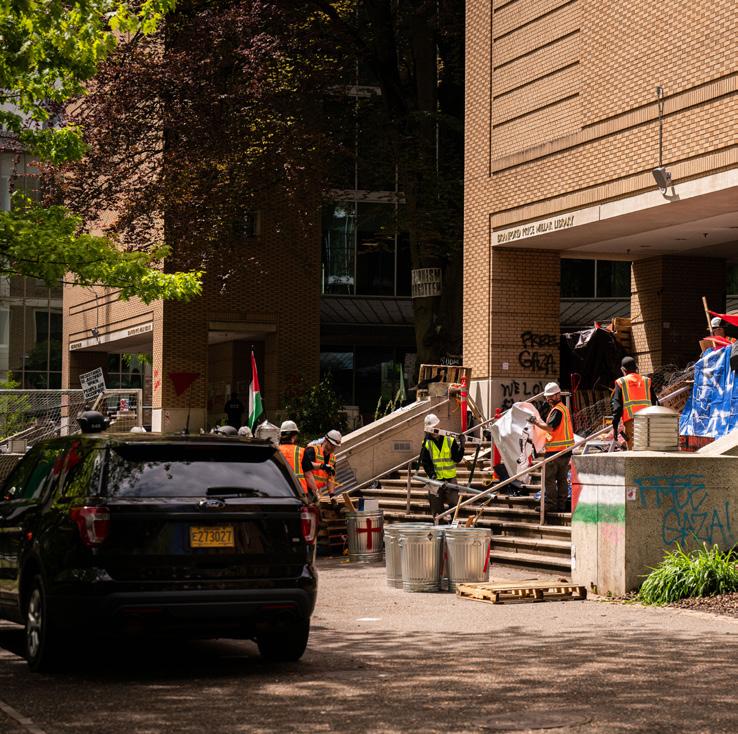
FRIDAY, MAY 3
Cleaners were at the boarded-up library. Minimal police surveillance was on site. PSU announced that the library would be closed until the fall.
MAY 8
6 p.m. — Small crowd protested in front of the CoCo Donuts campus location. Minor police presence. No violence or property damage.

MONDAY, APRIL 29
12 p.m. — Library proactively closed. Campus Public Safety Office (CPSO) showed up, alerting the protestors that they should get ready to leave the portico.
11:55 a.m. — President Ann Cudd emailed an update to pause receiving donations from Boeing.
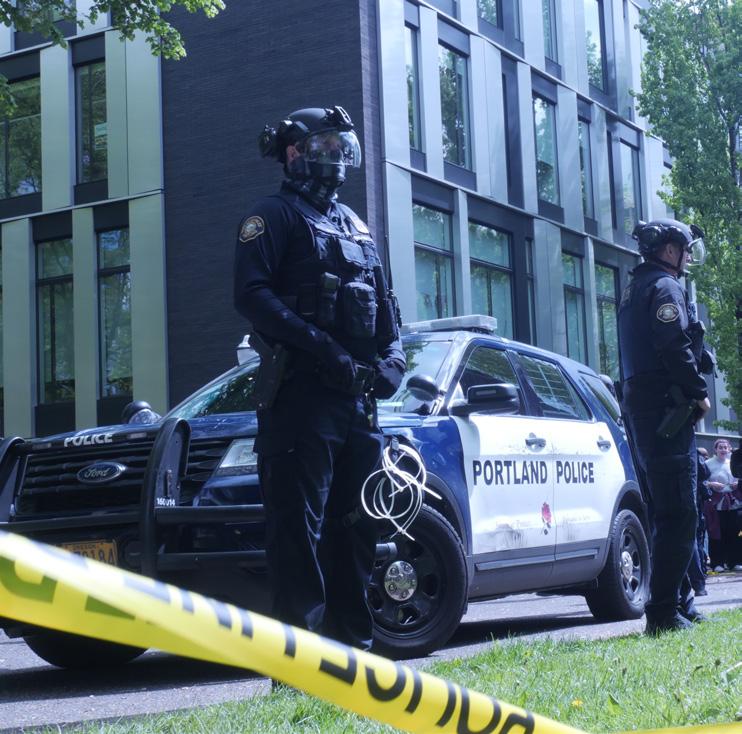
5:58 a.m. — Police arrived on site and taped off the South Park blocks. PPB sent messages to protesters inside the library via bullhorn to leave the library, and if they did not they would be subjected to arrest for second-degree trespassing (ORS 164,245).
6:05 a.m. — PSU Alert: “Police activity at Millar Library.”

THURSDAY, MAY 9
Around 8 p.m. — About 100 demonstrators set up three tents in front of Hoffman Hall. 20 PPB officers responded within 30 minutes. Protestors responded by linking arms and moving forward on the police. Having successfully removed the tents, PPB retreated.
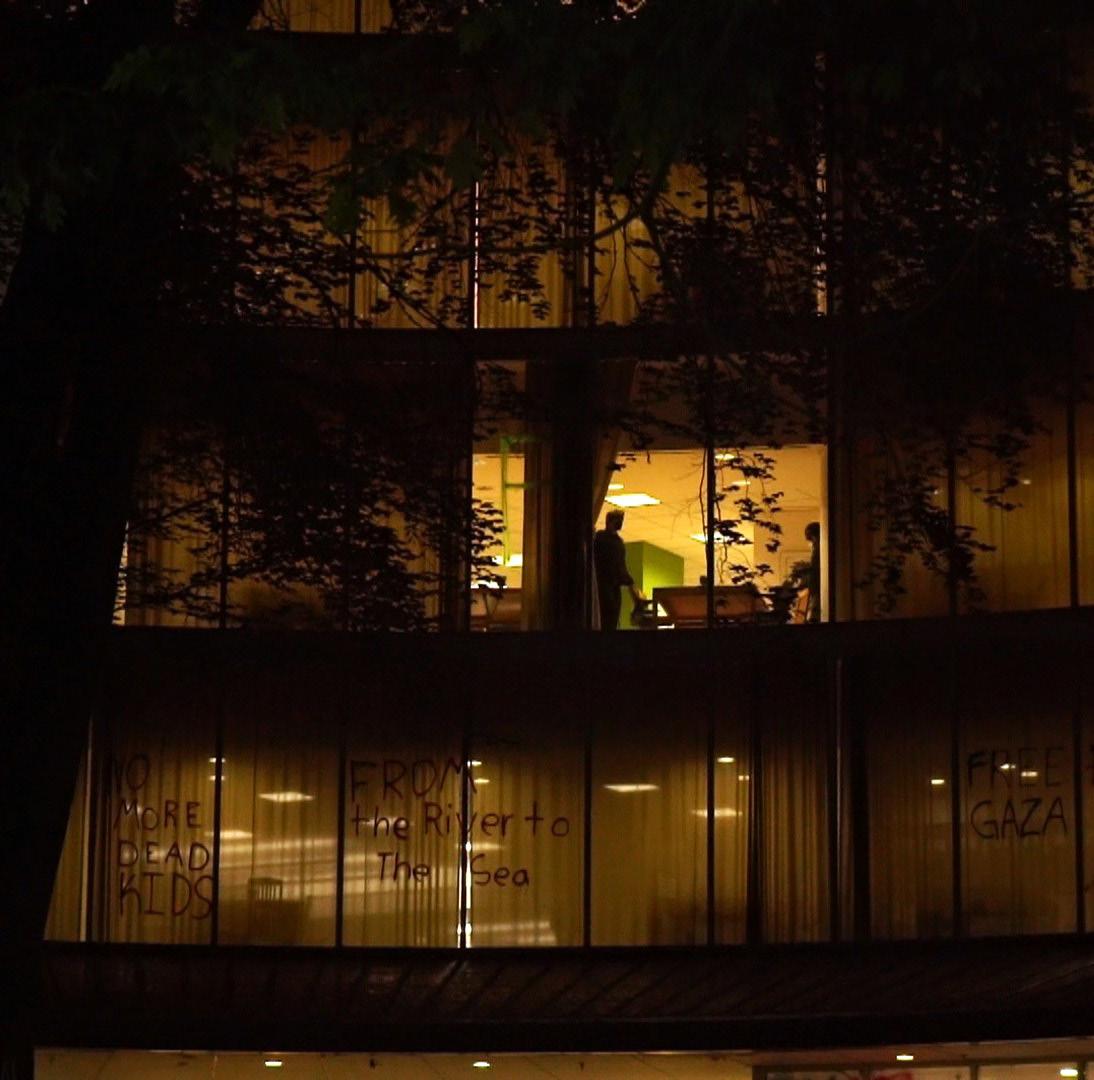
MONDAY, APRIL 29
Around 7 p.m. — Protesters gained entry to the library.
7:30 p.m. — PSU Alert: “POLICE ACTIVITY at Millar Library. Avoid the area.” No police were seen. Protesters released a statement to Vanguard explaining their occupation, inviting students to continue accessing the library, and iterated that no books would be harmed.

6:45 a.m. — Vans pulled up behind the library. PPB unloaded chainsaws and entered the library through the side door and emergency exit. They made their way to the roof and descended, clearing the building from the top down.
7 a.m. — Arrests were made behind the library.
7:02 a.m. — PSU Alert: “Campus closed due to ongoing incident at the library.”
8:40 a.m. — Police widened the perimeter with tape.
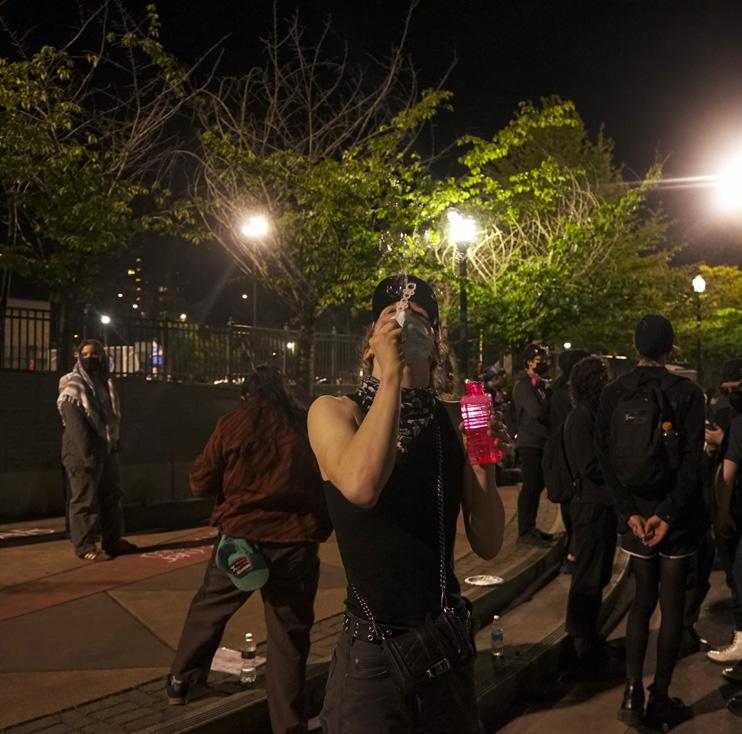
FRIDAY, MAY 10
8 p.m. — Rally held at the Walk of Heroines. Bike cops and PPB were present.
9:40 p.m. — PSU Alert to shelter in place. On Saturday afternoon, CPSO released a statement confirming that a small group of individuals elsewhere on campus gained access to Parkmill with the apparent intent to occupy the building. Protestors had left before the officers arrived.

Amid the nationwide college campus protests against the war in Gaza, comparisons are being made between these present-day movements and the student-led organizing that took place on the same college campuses during the Vietnam War. Many who partook in the Vietnam War protests are now commenting on the tactics and messaging used by today’s protesters. A question debated is, can these two moments in history truly be compared? The jury is still out.
Some 1970 protesters abhor today’s protesters, criticizing their motives as ignorant and their tactics as undermining a just cause. Still, others hesitate to lump today’s protesters—and each individual’s motives—into an all-encompassing amalgamation, i.e. “the protesters.” These conversations are being held all across the country. Given our notable history of war protests and occupation, Portland State is a good case to investigate the then-vs-now distinctions of the protests that have taken place and how onlookers discuss them.
With his arms linked in a line of student protesters and facing a wall of riot police, Doug Weiskopf yelled to his crew that, if they weren’t willing to be beaten or taken to jail, they ought to leave. It was May 11, 1970, and PSU students were on strike. Weiskopf was a primary organizer of the strike.
This came after months of continued presence by military recruiters on campus who faced pushback from the student body. The war in Vietnam continued, deaths on all sides were mounting and public support for the far-off war was collapsing, particularly among young people. When police opened fire on student protesters at Kent State, killing four and wounding more, student activists at PSU organized and began a strike.
Parallels lie in the lead-up to the protests that took place on campus starting in late April of this year. After Hamas’ massacre of Israeli cit-
izens, their government began a widespread and indiscriminate bombing campaign against Hamas that has, up to now, left tens of thousands of Palestinians dead, many of them children.
The Israeli government’s tactics have been criticized around the world, least of all by the United States government, which continues to deliver arms to Israel. Though, as we go to print, President Joe Biden paused the shipment of bombs to Israel, citing concerns about their use in an offensive by the Israel Defense Forces in Gaza. Students at U.S. college campuses are among the most prominent critics of the war, and in April took to their campus quads to rally against the government’s continued support of the war.
At PSU—in 1970 and now—demands were made and evolved as the movement progressed. What was similar was that the demands were largely argued to be the “voice of the student body,” but didn’t necessarily capture the opinions of the majority. Back then, according to a student-created documentary about the protest, The Seventh Day (1970), a survey found that the majority of faculty and students weren’t against the university’s policy on military recruiting on campus. Today, student onlookers felt aggravated by the campus closures due to the protester’s presence. However, significant distinctions stand out.
In 1970, the primary demand was that the university would bar military recruiters from campus, according to Weiskopf. Though, other student protesters had other demands entirely. Memorialized in a photo in 1970, a young woman can be seen sitting on one of the many barricades erected around campus. She holds a sign that lists not one but four demands: “1. U.S. Out of SE Asia Now; 2. Troops & Cops Off Campus; 3.Free Bobby Seale; 4. Detoxify Nerve Gas.” After riot cops came to campus and beat students, leading to several hospitalizations, the protesters added to their demands, specifically
that the mayor disband the Tactical Operations Platoon, aka the riot police.
Today, protesters focused on pressuring the university to cut ties with Boeing. That expanded to other—and all—companies that do business with Israel. They also demanded that the university publicly denounce the war in Gaza. Eventually, this list expanded to 13 demands
Building occupations were also a throughline. 1970 protesters occupied Smith Memorial Student Union (SMSU) as a de facto headquarters. “We were camped out in that building for a week,” said Weiskopf, the then-student organizer. “And there was talk of how we trashed the place, but no. There weren’t holes in the walls. There weren’t burnt carpets. There weren’t broken windows. There weren’t torn curtains. We left the place, and we cleaned up after ourselves after we left, as best as we could.”
Dr. David A. Horowitz—a Professor of U.S. Cultural and Political History who was present at the protest in 1970—corroborated this story. He remembered reports of vandalism in SMSU but said he had no firsthand knowledge of it.
The recent protesters also occupied a building on campus—the Branford Price Millar Library. Organizers Ember and Robin reported that the protestors had intentionally gained access to the library with the intent to occupy the space. Yet a rumor purported by a number of protesters was that the window was broken accidentally, and fearing retribution by the police, protesters entered the library ad-lib.
A major difference is that, in 1970, SMSU didn’t act as a fortress like the library was for protesters today. Also, the idea that damage occurred to SMSU at that time is questionable. The damage to the library is unquestionable. There was damage to the fire safety system,
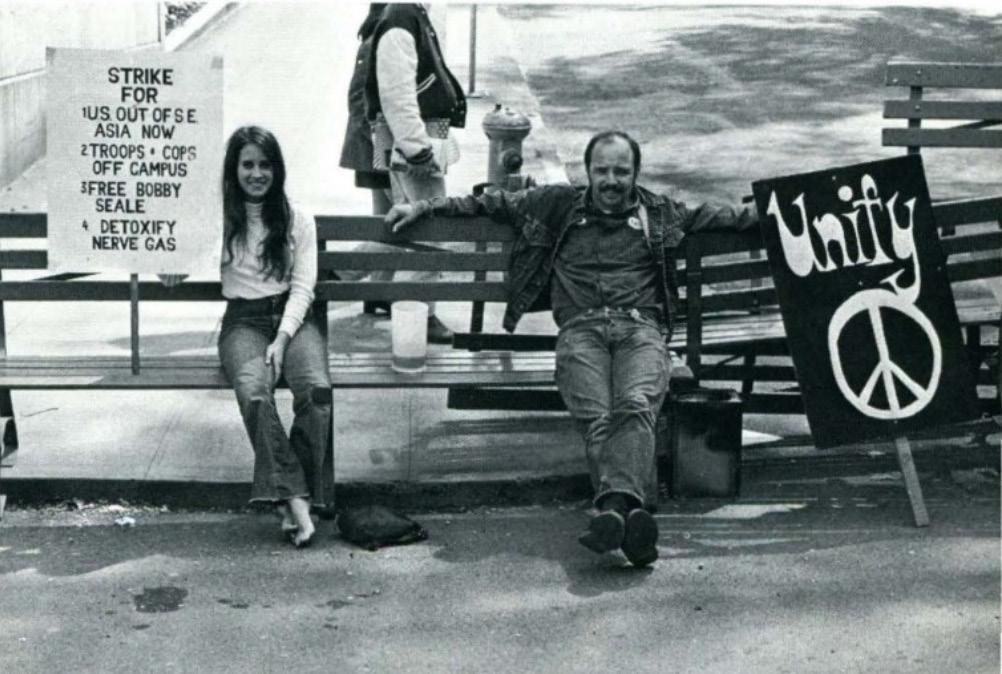
computer screens, television monitors and printers—a lot was destroyed or made unusable. Some protesters said that vandalism was intentionally used as a tactic to elucidate the importance we place on equipment over the lives of innocent Palestinians.
Still, others inside the library hadn’t intended for any of that to occur. In an on-screen interview with a local media outlet, one protester said that they broke down in tears when the vandalism was happening. “We want to respect your space as students and we’ve made sure that any damages incurred have been, you know, cleaned,” said a protester who went by James. “And from my understanding—again, this is just my understanding—funds are being [collected] to replace anything that [had been damaged by] the people who would come to tarnish our image.” In that way, James distinguished himself from fellow protesters or factions with different intentions.
James also maintained that the space was still open to everyone at the time of the occupation. Although, several library faculty said they weren’t allowed in at first. Or if they were allowed in, they were accompanied by an escort. Media was also allowed into the library but with an escort at all times. They were directed not to take any photos of individuals. Many who attempted to enter framed the occupied library as a hostile space. At one point, journalists with The Oregonian appeared to be chased out of the space and had water bottles thrown at their backs as they fled. Several people guarded the entrance at all times, asking prospective entrants who they were and what they wanted.
To be fair, I only saw this occur as the threat of police descending on the library became increasingly imminent. Some protesters were far more open to allowing anyone to enter. Later, after several belligerent individuals had been kicked out of the library, a protester spray-painted on the library wall, “No homeless allowed inside.”
Talk of outsiders was ubiquitous both then and now. Those commenting on the recent protests—including Portland State President Ann Cudd—have continually highlighted that nonstudents infiltrated them. James admitted that he wasn’t a student, but that student activists had invited him.
Several days later, when the first arrests were made, it was reported by the Portland Police Bureau (PPB) that only four of the 12 protesters arrested were students. Outside agitators also existed at the protest in 1970. According to Weiskopf, several high schoolers and other nonstudents came. According to him, “I pulled them
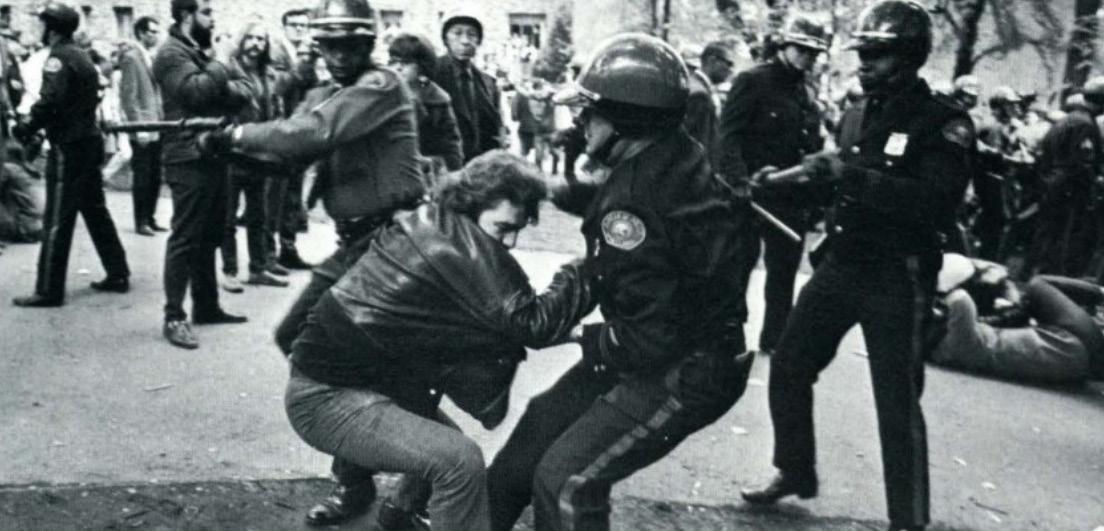
all in and I said, ‘all right, these are the rules. No violence, no antagonizing people, no spray painting, no breaking windows, no trashing anything.’ They just nodded their heads, and they behaved themselves for the rest of the week.”
In both the 1970s and today, protesters resisted police presence on campus. On May 11, 1970, the Tactical Operations Platoon, a new group of police officers created to confront unrest, approached protesters after several days of protester presence on campus.
Cudd called PPB early on for the recent protests. Once the protesters had entered and occupied the library, she gave the police control of the situation. They didn’t come for several days—though drones purported to be operated by PPB could be seen flying above and around the library early on, surveilling the scene— but when they did, they looked similar to the Tactical Operations Platoon that attacked protesters in 1970.
There are some big distinctions between police involvement then and now. First, according to Weiskopf, the PSU President at the time told the cops they weren’t welcome on campus. The riot police began beating protesters despite his request for them to leave. Students were left bloodied on the street. Dozens were hospitalized. Here and now, PPB only came after a few days of quiet. When they finally showed up, they surrounded the library and created a large perimeter. They entered from the back and began escorting protesters out in handcuffs. A few

hours in, the protesters gathered on the portico and sprinted in different directions. One was knocked down as they ran and were arrested. When the cops went to drive those who had been arrested away, more protesters gathered and blocked the vehicles. The police then used what is believed to be smoke bombs, pepper spray and paintballs to push the crowd back in order to free the vehicles.
Eventually, the protesters gathered a block away from the library, linking arms. The riot cops created a line to keep them back and did so for several hours. After some hours, the library was secured with a fence. The police left, and protesters reentered the library shortly thereafter. The police then returned and arrested several more protesters.
The public’s response to the protests is strikingly similar, but disparities exist, too. At both protests, faculty members supported the protesters. However, there was also a heavy backlash against the protesters and their tactics. Weiskopf is among those criticizing protesters who occupied the library this past month, arguing that the violence used was self-defeating. He referred to the effectiveness of the non-violence used by his fellow protesters in 1970.
In 1970, protesters were wildly unpopular here in Portland and nationwide. Onlookers were interviewed as a part of the documentary The Seventh Day (1970). “I don’t like it one bit,” said one onlooker about the protest. “I just think that violence is a ridiculous way to do away with anything. These kids don’t know what they’re doing or what they’re thinking. I’m not for war. I’m completely for peace. But I don’t think these kids don’t know anything about anything.”
“I think this is a bunch of horseshit,” said another man in the documentary. “I think these guys are a bunch of kooks. I think [the cops] should run them all out.”
A woman, commenting on the marchers, said, “I think they’d get a lot further if the protesters cleaned themselves up and looked like clean Americans rather than dirty young men.”
But, at the time, there was also support. “I want to cry,” said one woman, having come down to the march after hearing about the attack on May 11, 1970. “I think it’s time the adults came forward and helped our kids. I think it’s time that we stop standing behind closed doors saying that they’re crazy and that they’re nuts, that they’ve got long hair and want to be radical. Sure, we know there are radicals in all of them, but my God Almighty, when are we going to step forward and start helping? When are we
going to stop letting kids stand up here and fight this battle by themselves? I think it’s terrible.” There are similar responses today. Many criticize the motives and the lack of context behind them. Others celebrate the fact that young people are standing up against violence perpetrated against innocent civilians in Gaza and supported by the U.S. government. A large difference in how the public reacted to protests now and then is the response directly after the major actions.
In 1970, after the students were beaten by police, thousands rallied behind them, marching to city hall and demanding that the mayor speak to what had happened.
Today, our campus is quiet. Protesters continue to rally, but there is no widespread public support. The focus is on the destruction of the library and the messaging that many see as verging on antisemitism. Still, many elders, faculty and onlookers recognize that their motives are in the right place.
One critic was Horowitz. A long advocate for peace in that region, he recognized that the protesters were correct in being appalled by the killing but that they were wrong in their messaging. “When you start to shame people on moral terms, then you yourself become the target of criticism,” Horowitz said. “And that’s one of the problems with the PSU demonstration and others. As other critics have pointed out, the protestors become the story, not the issues that are involved in the protest.”
Community members have consistently highlighted discrepancies between the movements in looking to the past to inform the present. Much of the messaging rejects the way things were done on campus these past few weeks and how the protesters’ actions are in stark contrast to the actions of protesters 54 years ago—yet similarities remain.
It may be too soon to have any semblance of finality—of distance—to allow an objective take on this year’s protests. Though derided at the time, the 1970 protests are now celebrated as having been a necessary step in ending an unjust war.
After the library had been cleared and workers were painting over the graffitied walls, I got the chance to walk through to survey the damage. Messages such as “Free Palestine” and “From the River to the Sea” blanketed the walls. After a while, the messaging became redundant. One, though, caught my eye. It was the words scrawled above some urinals in one of the bathrooms: “History will remember us kindly.”
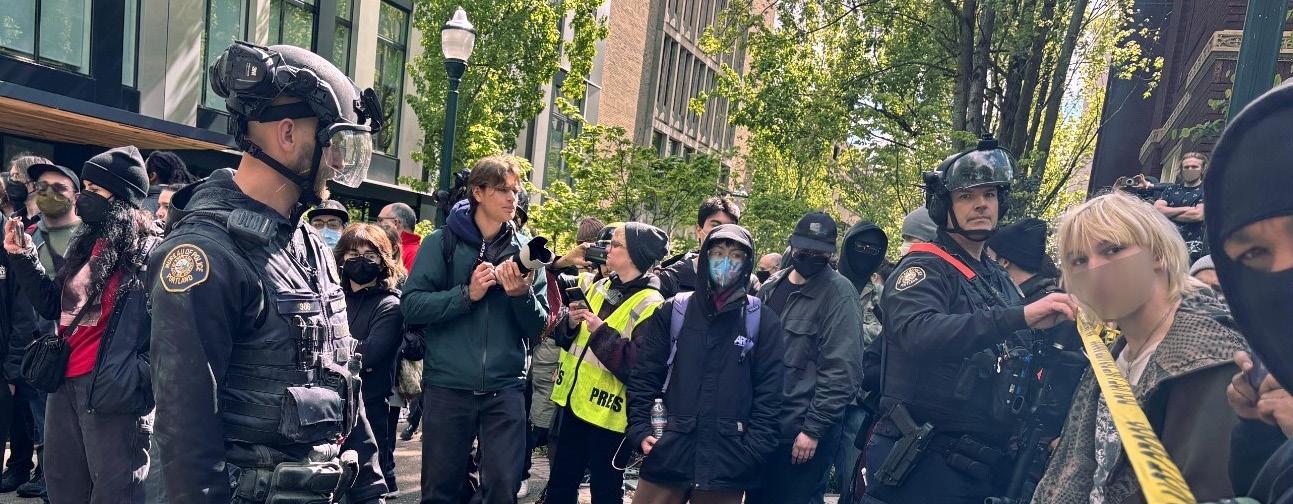
As journalists and editors, we are often behind the scenes—a voice on a video or a name on a byline and nothing else. This week, we felt it was important to be more. While we are journalists, we are also students, and seeing the events that unfolded in our community impacted us all differently. As journalists, we are first observers, reporters, distanced and unemotional and unbiased, but as students, when something like this happens in our community around us, it’s hard to be fully that. This is a place for us to recognize that impact on us as journalists and as students to live in that dichotomy of being both.
The support we’ve gotten from the community has been so overwhelming. I can’t help but start by expressing my gratitude to the people who make up this university. Without all of you tuning in and sharing your thoughts, all the hours we put in, the people we spoke to, the sacrifices we made, and the risks we took, that would have all been for nothing.
Secondly, none of this would have been possible without such an incredible team. Over the few days that the occupation lasted, I have seen so much commitment, passion and bravery from my team members. Belonging to this posse of Vanguard has become a validating and inspiring experience that I’ll carry with me.
I’m not here to share my personal beliefs about all of this, I don’t think that’s the responsibility I have. All I’ll say is that you can never truly understand a situation until you’re on the ground witnessing it, speaking to the people who are part of it. The truth is a difficult thing to harness, and those with the largest platforms tend to be the ones with the reins.
On a Monday, I walked past a crowd gathered at the library. I craned my neck as I went, taking a long time to stare. Someone in a beanie and a black mask waved. I waved back, and then they continued moving supplies into the barricaded portico. Before leaving, I slipped my laptop into my desk, like I do most days, not having the foresight to consider what may come or that campus may close. It did close. I got the message the next morning, a Tuesday. I naively thought that I—a graduate student with a faculty badge—could still access the buildings so that I could retrieve my laptop to attend my now-virtual classes. But when I arrive, I am locked out. All of us are, faculty included.
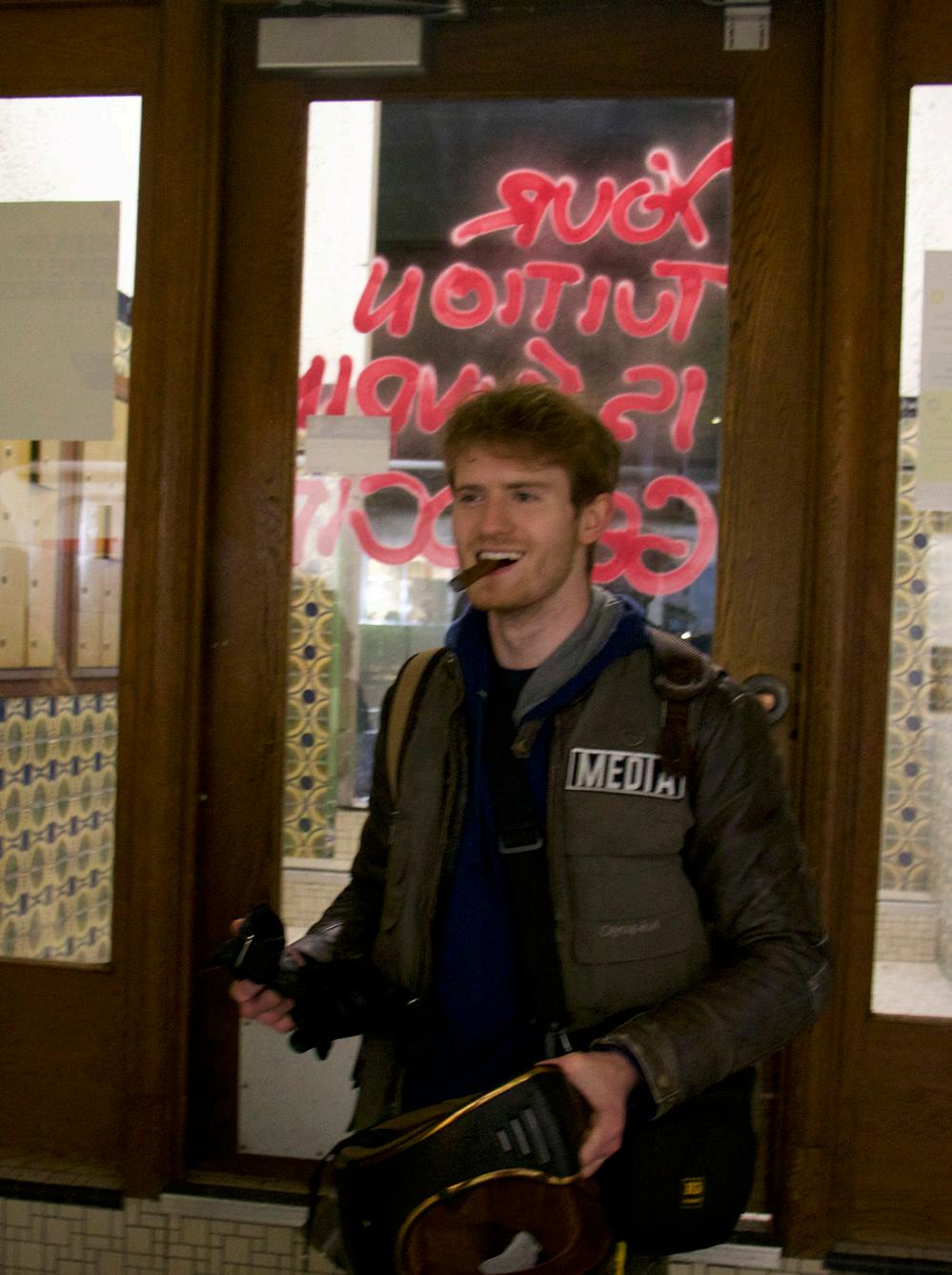
With nothing else to do, I went to the library. There, among the barricades and protesters who’ve now entered and occupied the library, I found several Vanguard reporters whom I don’t recognize. I introduced myself to Liam, who would soon become the face of the Vanguard Breaking News feed. He’s young. It was his first week on the job, thrown into something he had no time to mull over. All the better. We would need someone earnest and recognizable. It doesn’t hurt that he’s charming, pleasantlooking and has an air of innocence one might take for candor or trustworthiness.
With him was Sergio, Vanguard’s Multimedia Editor who, I’d learn, is anybody’s friend. A Peruvian who speaks perfect English
despite only having lived here several years, Sergio is more fixer than editor—working on the sidelines and waiting for a call, always saying yes to any request, and managing to follow through on any task handed to him.
Isaiah walked up and introduced himself. He’s just as capable and charming as the others. Anyone could see that Isaiah will end up in some far-off country as an on-the-ground war correspondent or something like it. He knows it, too. This job here is just a stepping stone, but he takes it seriously.
They began talking to a protester who went by the name James. James was the de facto spokesperson who stood outside the now-occupied library. I joined them, taking over the interview. I gently grilled James on the messaging, the timelines, and the demands. He pushed back without pause, offering responses I’m guessing he hasn’t had to give yet.
He said that the occupied space was open to all community members. I said that it was before.
He told me they were trying to create an inclusive space that prioritized students.
He pointed to the second floor, where I saw a couple of nonprotesters studying at some tables by the windows.
“Do they know that it’s illegal to be in there?” I asked.
He said it’d be totally irresponsible of us to withhold that information. Referred me to a sign that forewarned all who entered. I left campus for several hours, unsure if I’d be back. But as I sat at home, I felt compelled to get up and go. I arrived around 5 p.m. to find Sergio, Liam and Isaiah making Breaking News videos. Our Instagram was apparently blowing up. At 6 p.m., Campus Public Safety Officers came to tell the protesters that this was an “illegal and unlawful gathering” and that it was “time to go.” They laughed.
Officers handed them a flimsy, typo-filled slip of paper and then walked away. One of the protesters yelled, ‘we’re locking it down! Anyone that wants to go inside, do it now. It’s your last chance.’ But that never ended up happening. Instead, word spread that they had 12 hours before the cops came. I hadn’t planned on staying late, but felt I couldn’t leave the other reporters.
“Y’all ever been tear-gassed before?” I asked. They looked around at each other, all said no. I told them that it’s not so bad, but that they won’t be able to see or breathe. I finished by imploring them not to get arrested.
Alyssa, one of the News Editors, arrived then. Alyssa’s got a
no-bullshit attitude that acts as a guiding light for all of us, particularly the younger reporters. But she’s also maddeningly sarcastic and funny, which gets everybody off their guard. A couple of other non-Vanguard friends joined the pack. One of them is Colin, an architecture student and a future reporter for Vanguard He keeped close, particularly to me. I learned quickly that I could trust him, so began asking him to assist in tasks. After a while, he began intuiting the needs of the group and, at times, acting as an emotional support.
In the following hours, as the night grew deeper, community members gathered for several events put on by the protesters— a movie and an open mic. Our group had several huddles where we laid out game plans and predictions. We were sure that the cops were coming. Our guess was between 1–2 a.m., similar to when they evicted the protesters from the South Park Blocks a couple of nights ago. But it got later and slower. I told myself I’d leave within the hour, stay just long enough to help report on the cops coming. 12 a.m., 1 a.m., 2 a.m., 3 a.m. Nothing. We sat around chain-smoking, looking toward streetlight-lit corners for any sign of the police. The birds began to sing around 4 a.m. A protester brought me a coffee. We all paced in silence. Most of the reporters left. Alyssa and I stayed. The sun broke when we finally decided to call it. I got in bed around 7:30 a.m., just as the city began its day. I managed two hours of sleep and a few wild dreams before I threw some dirty clothes on and headed back to the library.

My experience with the protest was the most peculiar time of my life. I had been covering the protest on and off since Friday, April 26, but on Monday, when the library occupation began, my life began to be consumed with this story. I spent as much of my day as possible there, only really leaving to eat. I would sometimes find the time to sleep, but I would only sleep a few hours a night. I would stay out as long as possible, from sundown to sunrise. My main concern was being there to tell the story; I didn’t want to miss anything. I wanted everyone to have a voice and feel heard. I never felt unsafe throughout the week, and the support and feedback from the community made all of the sleepless nights and long hours worth it. I was happy that people felt heard.
I feel that the violence that took place was the fault of the campus administration. In the months leading up to the occupation of the Branford Price Millar Library, the demands of students who called for a divestment from companies such as Boeing were not engaged with. They were met with a stonewall from the Administration, who never touched on or commented on the demands even as the number of student groups who supported them grew. It would be a lie to say this series of events has not made me infinitely more angry at my campus administration than I was before. To deny your role and your power as a university to contribute to lasting peace in the Levant and Palestine feels insane to me. I am outraged as a student. I am outraged as a journalist who was put at risk during my coverage of the events. I am outraged as a Christian who is principally against the wielding of power against the dispossessed, and I am outraged as a human being capable of empathy.
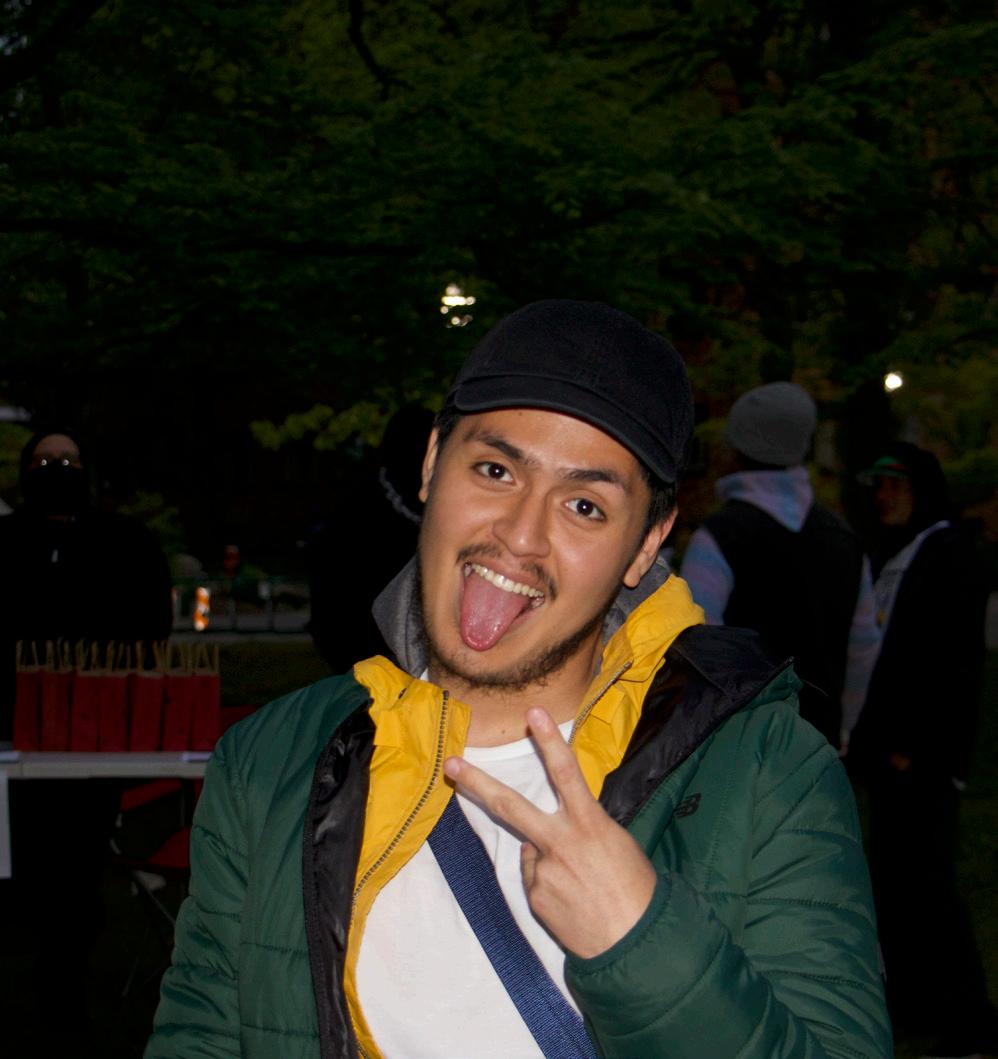
Cold nights, long waits, hunger, and insecurity. What happened? What did I experience? A young student who loves photography and videography only has one job to do. Capture unique moments that may never happen again. Or will they? On Thursday night, April 25, I received a message from my PSU Vanguard team asking me to go to the Branford Price Millar Library at PSU to take some pictures of what was happening. I never imagined that that night would be the first of many.
In the first few days, I began to neglect my diet as I listened to the protesters shouting “Free! Free! Palestine!” They were very friendly and always offered me a bottle of water so I wouldn’t dehydrate. What I liked most was that they loved PSU Vanguard and only trusted us, which encouraged us to continue reporting everything that was happening in the library.
On May 1, I woke up at 3 a.m. to meet again with my PSU Vanguard colleagues outside the library. They looked very tired, just like me, with only four hours of sleep. The night was cold and quiet, so I decided to take out my laptop and start doing homework that I had been procrastinating on. I stayed until 8 a.m. and then went home to sleep a little more.
The days passed, and the situation began to escalate. I knew that anything could happen at any moment. I knew things could get out of control. And so it was. In my head, everything had happened so fast. The protesters entered the library, the police tackled them, and a person with mental illness attempted to run over all the students and members of PSU Vanguard. It was a very strong and desperate situation, but there I was, capturing every moment that no one was expecting to happen.
The circumstances were catastrophic, but my love for photography and videography was infinite. I was there from the beginning to its end. I saw unjust arrests, people getting sprayed with mace and strong shoving. The ones who were supposed to defend us were betraying us. Shocking? Not really. I think we have already become accustomed to injustice and lies.
Me? I am just a simple Peruvian immigrant with an immense love for filmmaking. Me? I just have faith that this world will be a better place tomorrow. Thanks for the opportunity, PSU Vanguard
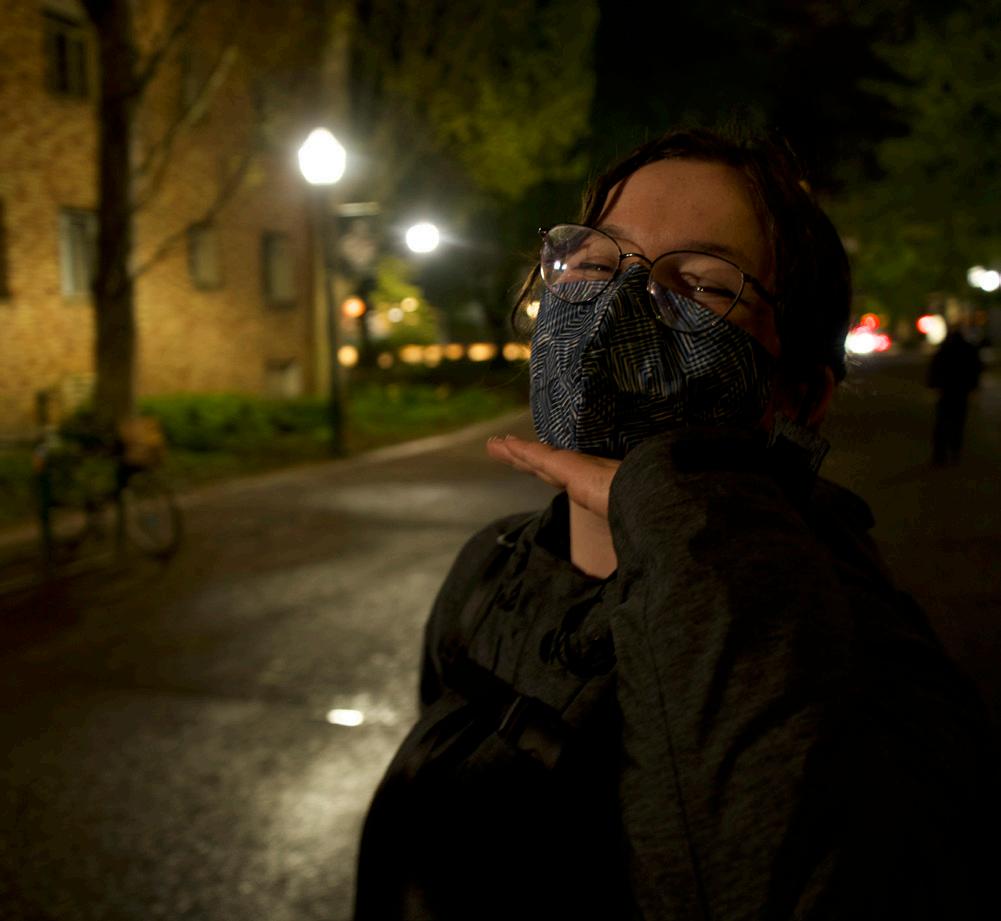
When I finally got home for the night after a long week of classes as a graduate student—our team at Vanguard got wind of an encampment being set up and a possible dispersal order given. I had just made dinner with my partner when this was sent. I ate quickly and headed to the scene of the first Palestine solidarity encampment on Thursday, April 25.
This sense of being summoned to action at a moment’s notice became the norm over the next few days. I spent the entirety of Friday, April 26, watching South Park Blocks for indications of police presence and protesters. I met some professional journalists who had finally heard of the situation.
While I was on the ground, the protesters were extremely kind to us, offering water and meals to us as we sat and observed everything that took place. I even got the honor of witnessing a Jewish Shabbat ceremony on the steps of the library, after which each person who participated and observed was offered matzah. Overall, being on the ground felt immensely important to document the events that took place on campus. I’m grateful for the firsthand experience and the ability to report the truth about the events rather than what biased media sources promote as truth when they were not even present.
I decided to take a step back after the first weekend, especially once it seemed that the PSU administration, the police, and the encampment had come to some sort of temporary agreement to coexist, which, of course, changed after the protesters took the library Monday. While I stayed largely off the scene, I continued to work behind the scenes managing our social media accounts. I have never seen so much support and hatred simultaneously on our account from both locals and beyond. I could not help but recognize a recurring pattern—people, for better or worse, wrongly associated us with the protest.
We are student journalists reporting on campus happenings for our fellow students. While we had hoped the hatred would be kept online, a person who had commented other rude messages on our videos posted a story, reading “OMW @PSUVANGUARD [middle finger emoji]” over a picture of them driving a car. This, of course, is the individual who drove their car into the park blocks during the ongoing standoff between protesters and the police on Thursday, May 2.
Again, among this hatred was also support from our community, offering endless gratitude for being on the ground and keeping the public up to date with the ongoing protests. It inspired hope in me that people not only were aware that these updates were journalistic in nature but also cared for fellow human beings rather than advocating for violence against our journalist team and the protesters alike. Ultimately, reporting on this protest reinforced my wishes for empathy and understanding between all people.
The days leading up to the original encampment on the park blocks were fueled by anxiety. Watching videos from Columbia, University of Texas at Austin and other colleges around the country, I knew something was bound to happen at PSU. Having gotten to know the community of Portland-area activists during previous protests, I knew they were likely planning something. I knew they were not the type to go down without a fight, no matter the consequences.
Even before the first tent went up, I felt something brewing on campus. There was a palpable aura of discontent, anger and despair—likely a side-effect of the long months most of us spent watching a genocide unfold on our phone screens. When the encampment was built and destroyed all in one day, my anxiety began to swell. The next day, when the group moved to occupy the library’s portico, my sense of unease all but doubled. By the time the protesters had broken into the library, I was consumed by dread and an almost unbearable sense of responsibility. My anxiety, however, had nothing to do with the protest itself but instead revolved entirely around the knowledge that the police could show up at any minute. I knew they would not be gentle.
After a few long nights spent out in the cold rain outside the library, I got used to the idea of the police raid in the distance. I got comfortable and grew to enjoy my time, getting to know my
knocked to the ground. I remember watching a police van drive towards a crowd of people whose average age couldn’t have been more than 21. I remember thinking I was going to see someone get badly injured or killed. I remember holding a friend of mine as he sobbed and asked me, “how could they do this to us?” I remember learning that a man drove into a crowd of protesters, specifically trying to target Vanguard reporters.
Despite all of this, the thing I will take away from this whole ordeal is the wonderful, liberating sense of community I felt at the encampment. The camaraderie among myself and the rest of Vanguard’s staff, the way we supported and encouraged each other, and the way the protesters cared for us like family, giving us what little food they could spare, are some things that will never leave me.
Community is a powerful, unbreakable force. No matter how dark our world becomes, community will always prevail.
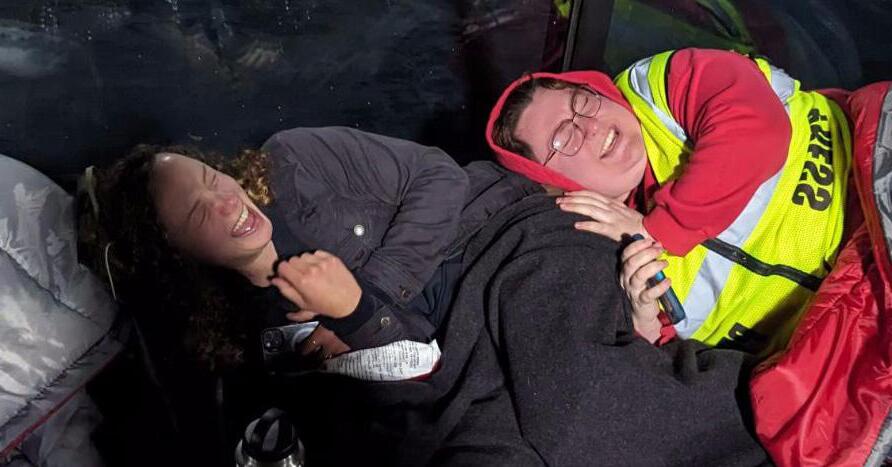
reporters and co-mingling with the protesters and community members who showed up in solidarity.
Despite the anxiety, I will look back on those nights fondly for years to come. The group at the library was a peaceful, interesting and supportive crowd of people from all walks of life. I grew closer to the reporters I had before and only communicated with them over Slack. I couldn’t bear the thought of any one of these people getting hurt.
As student journalists, we were woefully unprepared, with only two press vests and the majority of our equipment locked inside our office. As an editor, I felt responsible for the safety of all of my reporters—especially the younger ones. I found myself constantly imagining worst-case scenarios and making plans on how I would handle it if one of my reporters somehow got arrested or injured. None of these plans prepared me for what actually happened.
Once President Ann Cudd announced that the campus would be open on Thursday, May 2, I truly didn’t know what to believe. Up until then, school had been closed every night of the encampment. We all figured Cudd would never call the police when uninvolved students or members of the public were around—we all thought it would happen in the dead of night.
Nevertheless, after two uneasy hours of sleep, I awoke to a phone call at 6 a.m. I jumped out of bed, threw on my clothes and ran to the library. Despite the anxiety that had been festering within me over the last week, I felt eerily calm when I arrived on the scene. There was no time to be scared, no time to worry about anything but documenting the truth.
I knew what I had to do. And I did it the best I could.
The police raid and everything that happened after is a blur. I remember the protesters running out of the library to applause and cheers. I remember trying to dodge caution tape that kept getting moved. I remember seeing a student get arrested for leaving their dorm.
But, most importantly, I remember the police. Their blank stares as they pointed guns filled with paintballs toward a crowd of college students. The way they lined up in front of us like a murder squad, looking for any excuse to use brute force.
I remember rounding a corner only to be met with the agonizing screams of my peers who had been pepper sprayed or
I didn’t expect I’d be staying the night when I showed up to the library Wednesday morning. In fact, I came not in my capacity as an editor for Vanguard that day but as a freelancer for The Oregonian, merely collecting a couple of sources with thoughts on the ongoing protests.
I showed up on the scene and, seeing Kat and Cameron sitting on a bench, caught up with them on the events of the day. I left, coming back later, again fighting the natural instinct of hanging out with my team when I needed to be sourcing for a different organization.
I finished sourcing for The Oregonian and, in the process, realized that if there was a time to be a student journalist, it was now. Our team’s relationship to the community, our understanding of campus, and our ability to commit our entire newsroom to the coverage allowed us the unique opportunity to offer indepth, community-centered perspectives.
Tides became tipsy as we all attempted to balance our regular course load of homework and other jobs, sleep and food. No one was really getting paid, or at least very little, for what they were doing—the sleepless nights and round-the-clock coverage. It’s a hobby, if you can call it that.
We also lacked resources—without access to our newsroom throughout the duration, we shared two press vests and two cameras with people running back to the dorms for battery packs. Not only that, but at a university without a journalism program or journalism-specific advisor, we were going in very minimally trained on what to do and how best to cover situations like the protests and occupations.
In a student newsroom where editors meet in person once a week and remote contributors most often only meet you face to face in their interviews and hardly ever each other, the 24/7 coverage cultivated newfound familiarity and appreciation. I felt grateful to be a part of such a passionate team.
The following 30 hours on campus after that Wednesday morning are now somewhat of a blur. As I reflect, I remember small details. Medics checked in on our team as we sat in front of Fariborz Maseeh Hall, offering us water bottles and face masks. Beholden sentiments for the Subway on campus staying open for 24 hours. The solitary sound of birds chirping at 5 a.m. as the sun rose, shortly before the convoy of police arrived.
Of all the things I have covered as a student journalist and editor over the past four years, the Palestine protests have garnered some of the strongest thoughts and opinions from across the spectrum. As journalists, it’s our responsibility to maintain neutrality while uplifting the voices of those who are not heard. To that effect, I am proud of the team for what we were able to do despite the hurdles and incredibly grateful for those in the community who have reached out to let us know that our reporting had an impact, making the sleepless nights worthwhile. As the saying about newspapers goes, I hope we can continue to “afflict the comfortable, and comfort the afflicted.”
I’m grateful to have gotten to work with an engaging and thoughtful team through this process. It was important for us to be there to engage with students who needed to be heard and students who wanted to get an actual sense of what was happening.
One of the interesting developments was the way people interacted with us, wanting to tell us information and share their perspectives with us. It was a trust that we had developed with students and the community who knew from our work that we were dedicated to more than just one narrative.
There was a scramble of information and different perspectives that seemed to contradict each other. It was hard not to want to give more credit to those with prestige, but listening to the people’s pleas for deeper investigations led to the uncovering of dominant voices that were omitting and obfuscating important details. I think we knew there was a need to give clarity and transparency where there wasn’t any.
I’ve never felt such hope as I did being out there during events. When the largest rally gathered, the sense of community was overwhelming, like a collective hope. You don’t get this feeling from the news but from being there and witnessing it yourself.
The demographics of the group were often led by students, but there was also family there, elders and children, which showed a level of feeling safe for everyone. Even after the occupation of the library, events that happened were focused on the goal and striving for solidarity and liberation, one that encompasses us all. It’s a beautiful thing.
When I got home, I looked down at my hands. They looked strange like they were not my hands attached to my body at this moment in time. My mind was racing, alive with thoughts of what I needed to do next, while simultaneously, my body that was not my body was the most tired it had ever been. I could hear it screaming at me from a distant land. I needed to sleep, but in this ghost body, all I felt was numbness. I started to cry. I knew why, and I did not feel why in my body, not yet.
Flashes of the moments I had just seen came to my mind, and these two things that were so utterly opposed clashed in my mind—community and its seeming destruction. In one moment, I saw people in my community singing, dancing and sharing space together. I felt safe, and I felt it all.
The next, I heard screams of pain and saw people shoved and sprayed with mace, seeming so desperately to hold onto the community that feeling from the night before as a force of faceless people were actively destroying something they did not understand, and I felt calm and disconnected.
I felt like all my mind wanted was to go back to that feeling of the community where I felt safe, and I knew from experience that’s not how this works, not here, not now. That feeling in today’s world is fleeting, and you try so hard to get it back only to realize that you can only find it in moments.
So I found it in moments. I found it in my team as we rallied together. I found it in karaoke, where I screamed and sang a little off-tune, a little drunk with people who were also there and also just trying to figure stuff out. I found it in memory and truly felt tears and sobs that finally broke free. I felt it in sidewalk chalk when the community came back and tried again.
I felt it all, and then I took a step back and heard everyone’s voice. The heartbreak of librarians who only wanted what was best for their community, feeling the weight of having their space destroyed, the reactive fear of administration as they scrambled to maintain what they believed our university was and should be, the voices of some not feeling safety in the place that had made me feel so safe. These, at times, opposing narratives seemingly canceled each other out, but I recognized one thing we all had in common: we are all PSU. We may view our community differently, but all of our voices make up who we are.
Editor’s Note: The perspectives and opinions printed in this Letter to the Editor are the views of the author(s) and do not necessarily represent the positions of Portland State Vanguard or its editorial staff.
“Many of us have seen the vandalism to our library and while the cost of property damage cannot compare to the cost of human lives, this destructive protest is weighing heavily on our campus community… We have no control over what happens in the Middle East…” - President Ann Cudd, “Regarding PSU Offer to Protesters” email, 5/1/2024
“I expect they will tolerate [the occupation], provoke internal dissent among rads and libs, [stress] undercurrents of anti-Semitism, and then have PPB [Portland Police Bureau] do a night [raid] after all the headlines have passed.”
- Me, to a friend, afternoon of the first Park Blocks encampment
So much ink has been spilled over whether property destruction as part of political protest is “violence” that the concern has become not only trite, but co-opted. This cooptation echoes in the remarks of PSU President Ann Cudd regarding the recent library occupation, who heads it off the concern by balancing property against human life. In other times and places, Vicki Osterweil, Ta-Nehisi Coates, and others have defended the utility of things often considered “violent” in advancing protest movements. In my own co-authored work, we’ve criticized the tendency to rhetorically pit “violent” and “nonviolent” protest (and “bad” vs. “good” protestors) against one another. Doing so does the work of the state, against which such protest occurs. It’s all there—the rhetoric deployed by Cudd and the ensuing choruses of rebuttals and supports (in various shades) have become a familiar morality play, all the more frustrating for its predictability. That predictability characterizes the second quote above, from me to a friend, on Wednesday, April 24, 2024. Squint a little and it’s not far off what happened, give or take.
I want to advance a different idea here, wellrehearsed in other spaces perhaps, but seemingly absent from the main discourse attending to PSU currently. Contra Cudd’s characterization as “destructive,” the occupation of the [Millar] Library was creative and constructive and should be celebrated. (I, of course, have critiques, but these will remain internal to the movement.)
It was unequivocally an act of creation. In a stroke, through the power of a collective people’s General Assembly, the library named for PSU’s second president Branford Price Millar (a person about whom I can find little), was renamed the Refaat Alareer Memorial Library, after beloved (and martyred) Palestinian professor from
Gaza who vowed to fight off the Israeli invasion forces with a dry erase marker. Whatever Millar’s merits as a human, I’m certain he never crafted anything so beautiful and haunting as Professor Alareer’s last poem, “If I Must Die.”
Moreover, it was an encampment—an autonomous zone. Many people have never seen a liberatory occupation, but it is both a creative and constructive enterprise. It contained the stuff of life, growth, and strength: collected medical supplies and care; food organized, stored, made available to all; effective external-facing defense; spaces for recouping mental health; community building through art, poetry, and free expression; and, yes, even a mini-library full of informational ‘zines on practical and theoretical matters, attractive apparently across demographic, as present were those with disabilities, queer, trans, BIPOC, and white folks. They fought off counter-protests, armed riot soldiers, and self-appointed peace-police—many escaped gloriously to fight again another day. My good professorial colleagues, I know you, and you could not have organized so creatively and so effectively so quickly, nor had the temerity to hold the line against such repression. (Admin, of course, would have selected a Task Force, written a lengthy report, and forgotten to schedule the follow up meeting.) Colleagues, our students are braver than we are, smarter than we are, more moral, and eminently more practical. They are creative, constructive, and courageous. And they produced a turnout that [the] Faculty Senate, PSU-AAUP, and the Presidential Speaker Series can only envy.
The opposition on the other hand—PSU Administration, Portland Police, and, I assume, at least some FBI [Federal Bureau of Investigation] and Homeland Security Investigations (HSI) observers—are both boring and destructive. My sadly accurate thoughts above regarding the opposition response are pedestrian because they are from a well rehearsed playbook. These patterns aren’t new or interesting and I detail them with regard to anti-police protests here. The playbook is old—co-opting moderates, splitting movements, negotiating cynically, maintaining a veneer of legitimacy—and differs little from our imperialistic counterinsurgency efforts overseas. The similarities between smothering domestic protest and military counterinsurgency ops do not stop at ethos, but extend to technology, funding, and personnel
Such authority has no new ideas. It has no answers except destruction and no desires except maintaining power and control. It has no interest in sharing power, however much politicians and university presidents pretend to negotiate. Cudd’s admission that “We have no control over what happens in the Middle East” just says the quiet part out loud. The [United States] absolutely participates in and funds genocide, but you and I have no lawful

control over this whatsoever, no matter what pretenses we harbor, unless we interrupt and disrupt. Our students understand this intimately—they have seen opportunity dry up, costs soar, racism reinvigorated, bodily freedom evaporate, a virus ravage the poor, evictions multiply, reactionary violence on the march, and now they watch a US-funded and -supplied genocide unfold in real time. Their response? To shake off the mental bonds of University education—which tells them to vote for professional politicians, call their Congressperson, write a blog, and start a nonprofit—and instead construct a joyful and creative autonomous community to force boycott, divestment, and sanctions. Until the domestic portion of our military industrial apparatus destroyed it—as it will eventually destroy us all.
The power of protest is not, as I think the liberal establishment believes, to persuade power to act. Power has no time for you or interest unless you are producing profit; progress made is usually temporary as we proceed inevitably towards unending crises of capitalism that provoke ever more fascistic reactions. The power of protest is that it reminds us that we are free. It is a space where we bump up against others, act and react according to our morals and instincts as conditions change, and work together towards common goals, unbound by the internal surveillance that strangles our souls during so-called normal life. Some of us, my colleagues, are unable to remember this, if we ever knew it. But the students—constructive, creative, brave—will teach us all before the end. Free Palestine. And free all of us.
